Passion on the Edge:1 Love and Marriage Amongst the Hare Krishnas—A Case Study
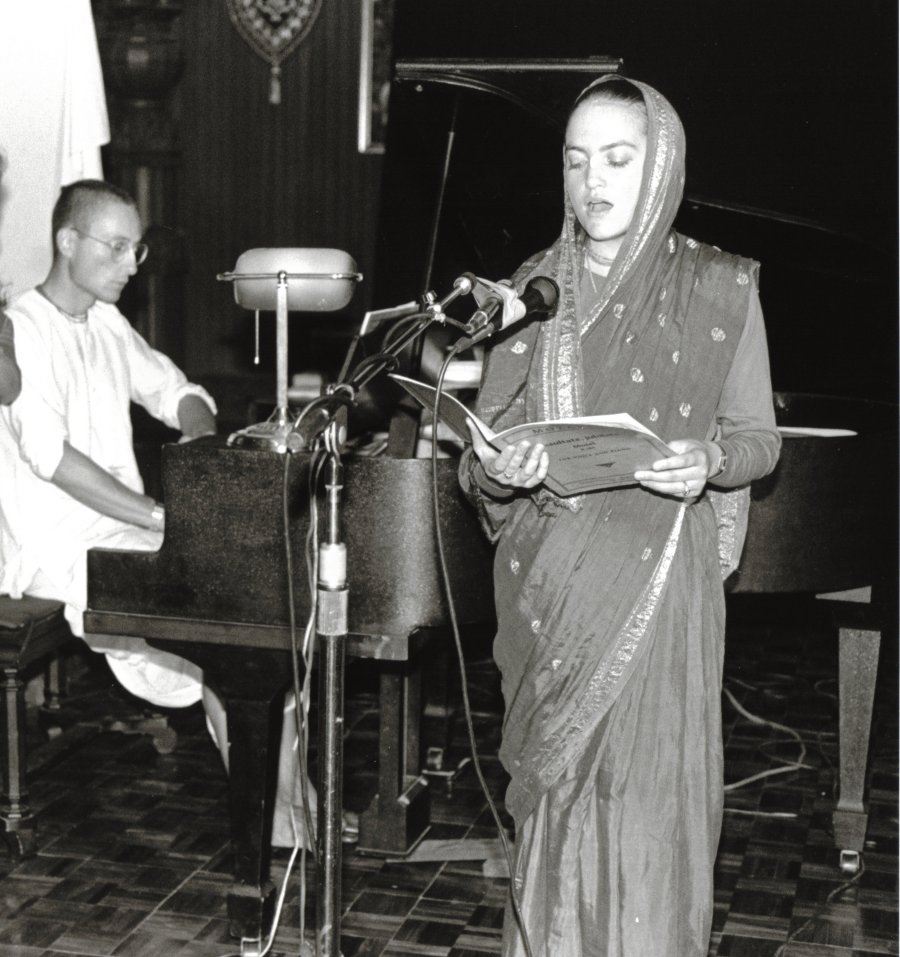
Ragamathani devi dasi sings a Krishna-ized version of Mozart’s motet Exsultate, jubilate, accompanied by Hrishikesh dasa at the piano, at Bhaktipada’s 50th birthday party (September 7, 1987).
August 26, 1956: On this date in history, Rebecca Elizabeth Smith is born in Seattle, Washington. Her father, William Overton Smith (1926-2020) was a well-known jazz musician, clarinetist and composer, best known for performing with pianist Dave Brubeck intermittently from the 1940s to the early 2000s. He taught music composition and performance for thirty years at the University of Washington School of Music in Seattle. In 1957 he was awarded the prestigious Prix de Rome, leading to study there and a lifelong love affair with the city, where he maintained a second home. Smith had four children,2 and died at the age of 93 from complications of prostate cancer.
In 1973, at the age of 16, Smith’s daughter Rebecca leaves home and joins the Seattle ISKCON temple at 400 18th Avenue East. Why did she leave? She told me, years later, that she felt her childhood emotional needs were not fulfilled. Her father taught at the university all day and played clarinet at the jazz clubs all night. Her mother was a socialite, and more interested in attending parties, bridge club, social events, etc. than taking care of her children. Once, around the age of four, Rebecca got lost during some big event, maybe a huge outdoor concert or fair or festival, and cried for hours. Eventually her parents found her, but she told me that traumatic event shaped the rest of her life and gave her trust issues.
On August 20, 1973, Bhaktivedanta Swami Prabhupada, the Founder/Acharya of ISKCON, at the time living in England, wrote to Sukadeva dasa Adhikari, who I assume was the temple president at Seattle ISKCON, and in his letter Prabhupada accepted Rebecca E. Smith as his initiated disciple, along with seven others. Prabhupada gave her the name Ragamathani dasi.3 He ordered Sukadeva, “Hold a fire ceremony, and distribute sumptuous prasadam to one and all.” According to the Srila Prabhupada Disciples Database, Ragamathani was initiated in Seattle in 1974, but I think this is incorrect.
Ragamathani devi dasi has a lovely soprano voice, and is noted for her beautiful singing. She has a sweet personality and speaks softly. As she is unusually attractive (exceptionally pleasing to the senses), she must have a husband in order to live in the temple. Temple authorities order her to marry a particular man (she once told me his name, but I forgot), and the marriage ends in divorce a year or two later.
Around 1978 or so Ragamathani moves to Los Angeles ISKCON and marries Dulal Chandra (Howard Fawley), who is a successful businessman in Los Angeles. Dulal, originally from Greene County, Pennsylvania, served as the drummer in Kirtanananda Swami’s Road Show. He accepts diksa while on tour with the group in Atlanta, Georgia in December 1971. In 1974 he moved to Los Angeles, but still visits New Vrindaban periodically. In 1975, Dulal served as president of ISKCON Pittsburgh, a New Vrindaban satellite center. Dulal moved back to Los Angeles, where he marries Ragamathani. According to the minutes of the 1978 Mayapur GBC meetings, Kirtanananda Swami recommends him for sannyasa.
In 1980, Kirtanananda Swami, recognizing Dulal’s shrewdness and business acumen, invites him to return to New Vrindaban and serve as the community’s comptroller. He promises Dulal a substantial salary and a nice one-story house in Talavan, and the couple moves to New Vrindaban. Dulal serves in that capacity for six years. In the summer of 1982, Ragamathani recorded a cassette tape with Sri Bhajan dasa, a visiting Bhaktipada disciple (initiated in November 1981) and gifted singer from Bombay, India. She also recorded some songs with an unknown guitarist.
No place for a brahmachari
I first met Ragamathani in 1983 at her home in Talavan. When I joined New Vrindaban in 1978, I surrendered all my belongings to the temple, including my extensive classical-music vinyl record collection, piano scores, and my Rivoli Sonola Italian-built 120-bass piano accordion which my father had purchased for me when I was eleven. I hadn’t thought about these items for five years, but they had been stored in the garage at Pittsburgh ISKCON. Dulal had rescued these items from the garage when a huge storm passed through Pittsburgh (or was it a broken water pipe?) and the garage was flooded. He invited me to stop over at his house and pick up these items, as he thought perhaps in the future I might have use for them.4
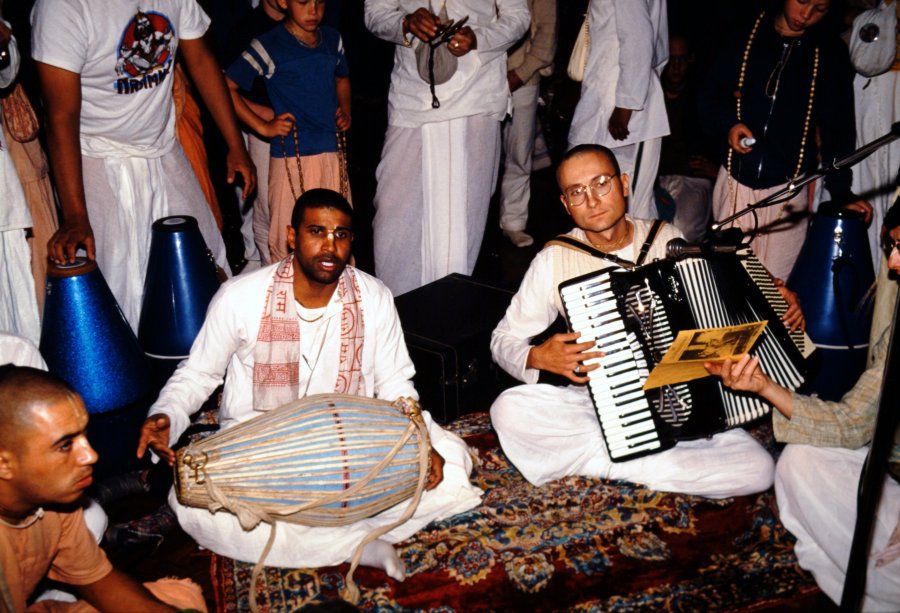
For New Vrindaban’s first twenty years, traditional Bengali-style music was the norm. Here Hrishikesh sings the Damodarastakam prayers and plays accordion while a visiting Indian devotee plays a clay mrdanga at New Vrindaban (c. Kartik 1986).
At the time, I was always out on the road on the pick. During one of New Vrindaban’s monthly three-day sankirtan festivals, I drove my van to his house to pick up my musical paraphernalia. Dulal was not home, but his wife answered the door. I was stunned by her beauty, and consciously kept my eyes focused on the floor. She invited me inside, where I quickly picked up my records, music scores and accordion, and left. As I was trying to be a strict brahmachari, I kept our conversation to a bare minimum. In fact, I think I was rather curt with her.
When I left her house, she was standing on the front porch. As I walked past her, I felt a rush of ecstatic energy surge throughout my body. It was intoxicating and overpowering and lasted a few seconds. I began chanting, “Hare Krishna! Hare Krishna! Krishna Krishna! Hare Hare! Hare Rama! Hare Rama! Rama Rama! Hare Hare!” in my mind, as I was quite proud that I had never once broken any of the regulative principles since I joined five years earlier.
Ragamathani, as far as I was concerned, was a very dangerous and powerful Maya Devi. My grand guru, Srila Prabhupada, warned his male disciples to avoid contact with beautiful women. Who knows how deep I might fall into the abyss if I even delayed for a few seconds on her front porch? This woman had an extremely powerful magnetism and could probably charm a cobra.
I had heard that Prabhupada said that beautiful women were witches, and they delighted in seducing spiritual seekers to give up their vows. They were dangerous, like tigers, and should be avoided at all costs. It took me a few days to get her memory out of my mind, but eventually, I became absorbed in my service of collecting money again, and I forgot her.

Bhaktivedanta Swami Prabhupada taught his disciples that women were dangerous; he liked to compare them to witches and tigers.
The Krishna Chorale
Fast forward three years: In October 1986, on Bhaktipada’s order, I abandoned my service as a picker, moved back to New Vrindaban, and established the New Vrindaban choir, later known as the Krishna Chorale. Bhaktipada wanted to establish a Western classical music program at New Vrindaban, and he wanted me to direct a choir which would sing the great masterpieces by Bach, Beethoven, Brahms, Handel, Palestrina, etc. with Krishna-ized lyrics; that is lyrics that supported the Gaudiya Vaishnava conception of God.
I was a logical choice for this service. I studied music in high school and college and, in May 1978, received a Bachelor of Arts Degree with a double major: Piano Performance and Music Education. I studied voice in college, sang Handel’s Messiah with the 200-voice choir of the Reorganized Church of Jesus Christ of Latter Day Saints Temple in Independence Missouri, sang in the chorus (in costume and makeup) for performances of Richard Wagner’s opera The Flying Dutchman with the Kansas City Lyric Opera, sang the role of The Bonze in a concert performance of Puccini’s opera Madame Butterfly with the Northland Symphony Orchestra, and four years earlier served as student director at my New Jersey high school, rehearsing and directing our chorus in an original composition I had written titled “We Are Chosen.”
Our first New Vrindaban choir rehearsal was held in the men’s prasadam room in the temple on November 9th. Ragamathani came to that first rehearsal, along with one or two dozen other Brijabasis. I mostly ignored her, afraid of her feminine charms. I wanted to be an upright and righteous devotee who followed the rules strictly. Besides, I got married five months earlier, and my wife also sang in the choir. I didn’t want any trouble or drama.
Everyone appreciated Ragamathani’s sweet demeanor, her beautiful voice and above-average musical excellence. She became our star soprano and soprano section leader. To help improve her skills she began studying voice with Helen Elizabeth Pierce Elbin (1905-1996), a voice teacher in West Liberty, West Virginia who was married to the president of West Liberty State College. The following year, 1987, I studied choral conducting and voice at West Liberty State College in order to improve my skills as New Vrindaban’s first Minister of Music. Ragamathani also gave singing lessons to New Vrindaban choir members, although her main service was typesetting books and magazines published by Palace Press.
Bhaktipada said our choir was one of his favorite projects: “Music will become more and more important when we have our new temple; it will be extremely important. Many, many people will come just for music. . . . I’d like to see at least ten men and at least fifteen women, regular members of the choir. There’s no reason we shouldn’t have a choir of twenty-five or thirty. . . . And then, of course, when you become a good group—cohesive musicians—you’ll be in demand to travel, which will be preaching. Eventually we’ll have a first string, second string, third string choir, so we can have one group that goes out traveling and still have our music that goes on here. Prabhupada said that Krishna consciousness would conquer by Cultural Conquest. In Cultural Conquest, one of the most important things is music. Music is something they [visitors] can take home. It’s something they become involved in.”5
Our choir performed fifteen concerts during its first year. We sang at festivals and even went on tour to the Marshall County courthouse in Moundsville, and to hospitals and nursing homes. We received nice receptions everywhere we went. The editor and publisher of the Moundsville Daily Echo newspaper—Sam Shaw (1913-1995)—attended some of our concerts, and he wrote favorable reviews in his newspaper. He also published a lovely review of our choir cassette recordings: “Jagad Guru” and “Blessed Assurance.”6
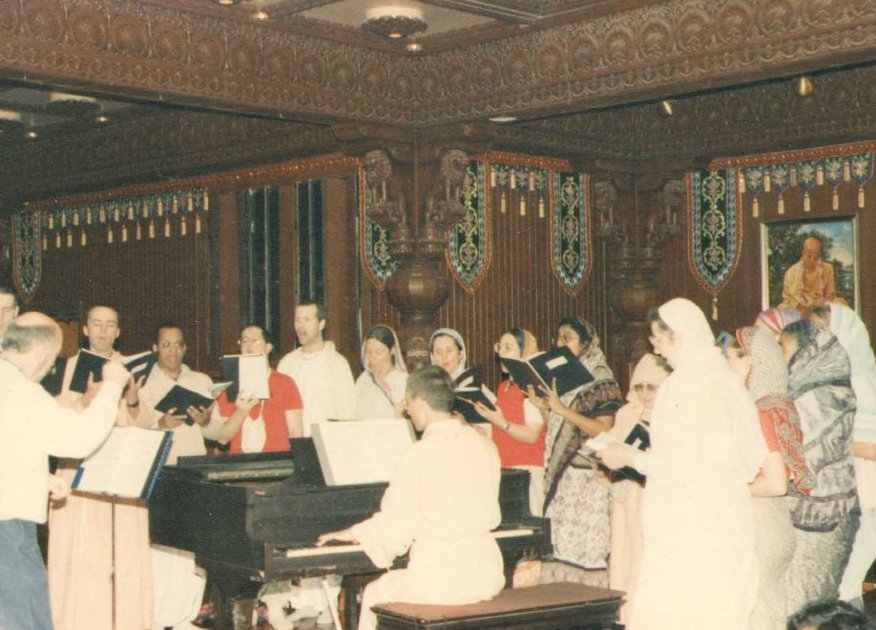
Choir concert in the temple. Professor Alfred R. DeJagger directs; Hrishikesh accompanies on the piano (c. 1987).
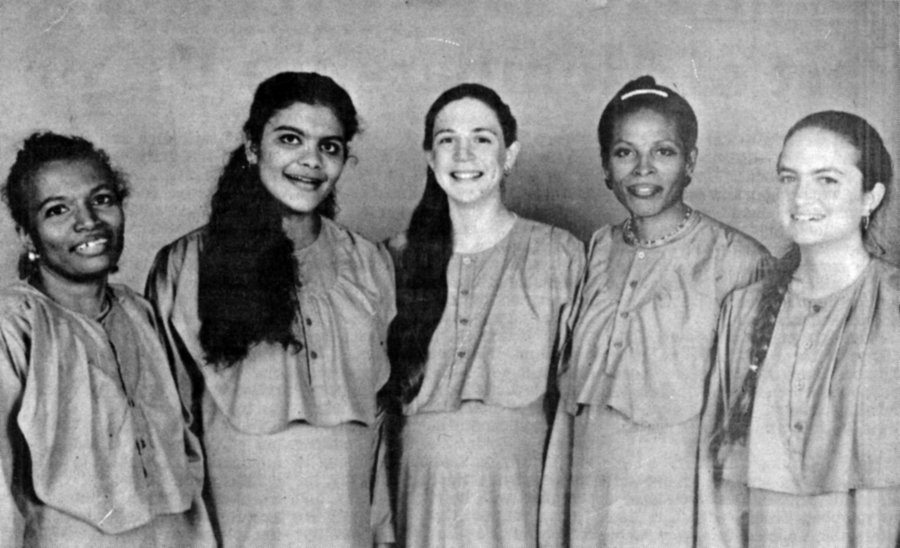
Principal altos and sopranos of the New Vrindaban choir: Janesvari, Shyama, Janaki, Bhavisya, Ragamathani.7
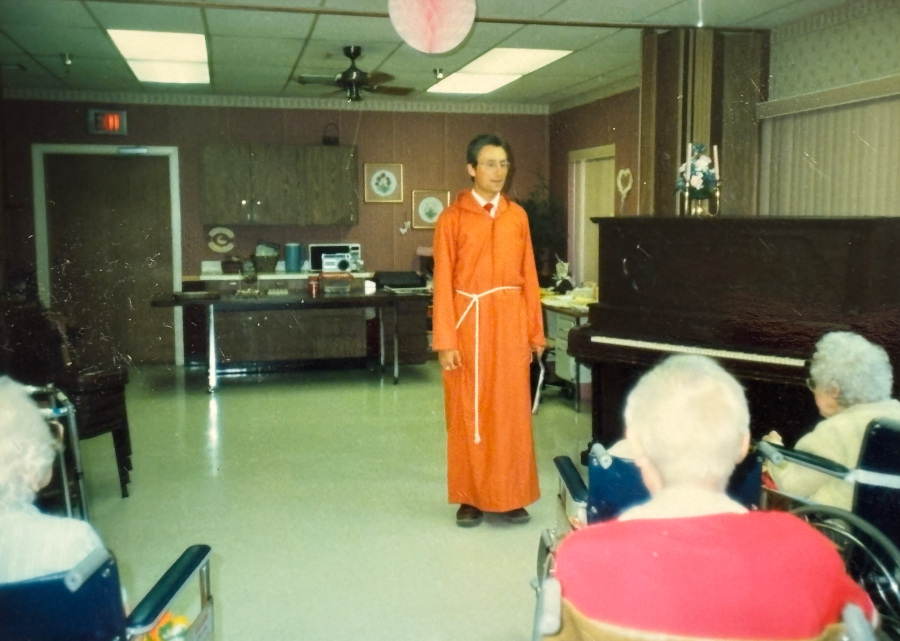
Choir director Hrishikesh dasa introduces the Krishna Chorale for a concert at an Ohio or West Virginia nursing home (c. 1988).
My feelings unmasked
In the spring of 1987, catastrophe struck: We lost our most talented member and star soprano: Ragamathani. I heard that her husband thought that the choir was taking too much of her time, and so he forbid her from singing with us. Perhaps he wanted her home so she could better serve him as a faithful and dutiful wife. Of course, this was a devastating blow for Ragamathani, as she loved singing and performing. It must have been heartbreaking. It was also a sad day for our choir, as we lost our most talented member.
On the other hand, although I knew this was not good for our choir, I felt a sense of relief. She was such an attractive Maya Devi that I sometimes found it difficult to concentrate when she was in the same room with me, even with a dozen other singers. I had to force myself not to stare at her; I thought she was so beautiful. But now since she was gone, I’d be better able to focus on the music and training our singers.
However, when I told Bhaktipada about the situation, he asked, “What do you think?” I told him that our choir would not be as good without her. She was our soprano section leader, and most of the other sopranos depended on her leadership.
Bhaktipada said, “Krishna’s service is the most important factor. Go and talk to her and try to get her back into the choir. She works at Palace Press.”
I was not happy about this, but out of duty I went to the press and found her sitting behind a typesetting machine. I told her, “We want you back in the choir. Please come back.”
She asked, “Why?”
I said, “You’re our best singer! The sopranos depend on you!”
She asked, “Is there another reason?”
I said, “Yes, Bhaktipada personally told me to talk to you and try to get you back.”
She paused, then quietly asked, “Is there another reason?”
I remained silent for several long seconds, and then I whispered, “Because I love you.”
I thought, “Jesus! What a thing to say! I’m not such an outstanding devotee after all.”
She looked at me intently with her big, beautiful blue eyes, and replied, “I love you too, Hrish. I’ve always loved you from afar, and now I am doubly thrilled that you love me too.”
I reminded her that we were both married. But neither of us were happily married. Ragamathani claimed her husband was abusive to her. Unfortunately, women and children were not treated well at New Vrindaban at this time. Wife beating was common at New Vrindaban in the 1970s and early 1980s. Sometimes, if a woman came to the early-morning temple service with a black eye, she might tell her girlfriends, “I got the mercy last night.” I heard Kirtanananda Swami say during a darshan at the Old Vrindaban Brahmachari Ashram in 1978 or 1979, “Three things improve with a good beating: your drum, your dog, and your wife.”
Kirtanananda Swami did not invent this maxim about wife beating; he heard it from his own spiritual master, who told his disciples, “If you become lenient, then she will be troublesome. . . . The husband beats, and she is tamed (laughter).”8
Ragamathani told me her husband sometimes hired professional prostitutes for the pleasure they provide. This, of course, would be extremely insulting to any wife. Lokavarnattama dasa (Larry Burstein), a New Vrindaban fringie and businessman with a wife and two children and a very large and lovely house at Talavan, once told me, “Dulal treats her like shit.”
Bhaktipada orders me to marry an Indian girl
I, on the other hand, was married to a very nice Bhaktipada disciple from India. Perhaps an explanation is in order: From September 1985 to April 1986 I served as co-director for Palace Publishing, and I lived on the farm. When I returned from a trip to India in April 1986, Bhaktipada ordered me to marry this Indian girl, the daughter of one of his prominent disciples in India: the Bombay High Court Advocate (attorney) Mahaprabhu dasa/Ram Krishna Maheshwari (1937-2021).
Shyama dasi’s father, Ram Krishna Maheshwari, first met ISKCON devotees at the age of 40, when he attended the January 14, 1978 grand opening festival for the Bombay Juhu Beach ISKCON Temple.9 He began chanting Hare Krishna and tried to interest his 12-year-old daughter Sandhya in chanting the Holy Names, eventually succeeding. Two years later on Gaura Purnima (February 1980) Mr. Maheshwari took diksa from Kirtanananda Swami Bhaktipada in Mayapur. His daughter accepted diksa c. 1984-1985.
Mahaprabhu was so fired up to preach that he created a temple at his home. He removed his car from his garage, parked it on the street, and converted his garage into a temple. He acquired cultured marble replicas of the presiding deities of New Vrindaban, Radha Vrindaban Chandra, manufactured at the New Vrindaban Mold Shop, and worshiped the deities in his garage/temple. Every Friday night he and his wife and daughter hosted preaching programs in their garage and invited dozens of guests to attend. The garage held about two dozen people, and the overflow crowd often spilled out into the concrete driveway. Programs consisted of aroti, kirtan, a lecture, and prasadam. Once, when I was in town (April 1986), he invited me to deliver the Srimad-bhagavatam lecture. Kirtanananda Swami Bhaktipada once attended Mahaprabhu’s Friday night program, and attendance flew through the roof.
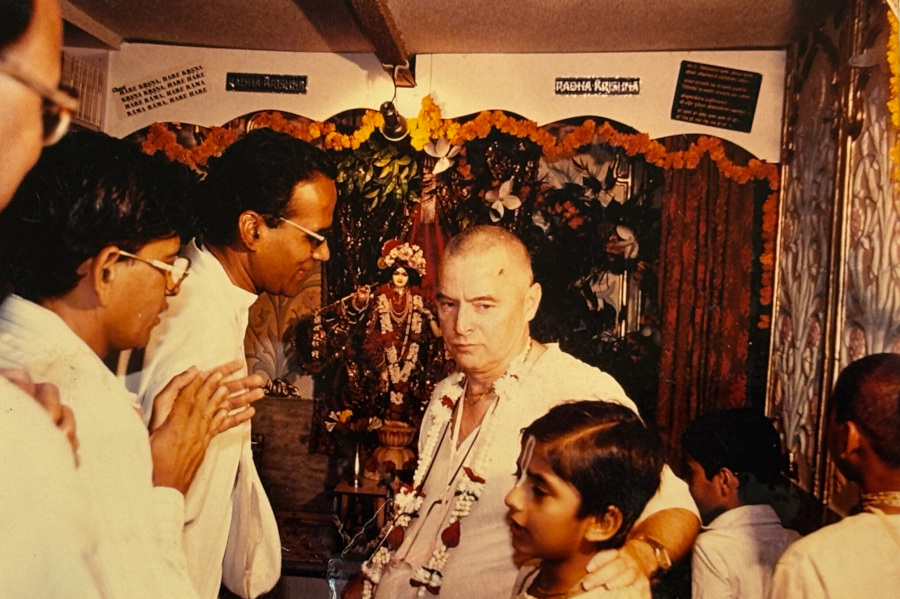
Bhaktipada visits Mahaprabhu’s garage/temple on 3rd Road in Khar, Bombay. Mahaprabhu (in the left/center of the photo with white beadbag hanging from his neck) speaks with Bhaktipada while Bhaktipada affectionately rests his hand on the shoulder of Mahaprabhu’s young son. The deities and altar appear in the background (c. mid-1980s).
Back at New Vrindaban in April 1986: When Bhaktipada ordered me to marry Mahaprabhu’s daughter, I refused and replied, “She’s not my type.” As punishment, Bhaktipada demoted me from my position as co-director of Palace Publishing, and sent me back out on the pick full time.
I used to love the pick. I was very good at it, and collected money fulltime for New Vrindaban from May 1980 until September 1985, when I started Palace Publishing as co-director with Chakravarti dasa (Peter Kauffman). The pick is demanding and stressful, but I was young and energetic and had great endurance and dedication. However now, in April 1986, I was not the young energetic man I used to be. I had lost much of my energy and stamina, probably due to overwork and insufficient diet. When I joined ISKCON in 1978, I was a healthy 22-year-old who weighed 160 lbs. By 1986, I had dropped to 148 lbs. and found myself ill more frequently. Picking for me had lost its pleasure and it became very difficult and even painful.
This time, after less than a month suffering on the road, I reluctantly agreed to marry this 20-year-old Indian woman. I was partly inspired by my grand guru, Srila Prabhupada, who also married a girl he did not like, due to his father who advised him, “If you marry a girl to your liking, it will be more difficult to leave her when you take sannyasa.”
At the time, I felt I had little choice in the matter. Bhaktipada explained, “the spiritual master is the representative of Krishna. If the spiritual master tells me to stand on my head, I stand on my head. If he tells me to marry this girl, I marry this girl. If he tells me to do this work, I do this work.”10
Bhaktipada told me to call the girl’s father, Mahaprabhu dasa, on the phone, long distance to India, and tell him to send his daughter over to Pittsburgh on the next flight. We would pick her up in Pittsburgh and bring her to New Vrindaban (about a ninety-minute drive) where we would be wed. After a few unsuccessful attempts to connect, I spoke to my future father-in-law on the phone and relayed Bhaktipada’s instructions. He replied, “Yes, just now coming.”
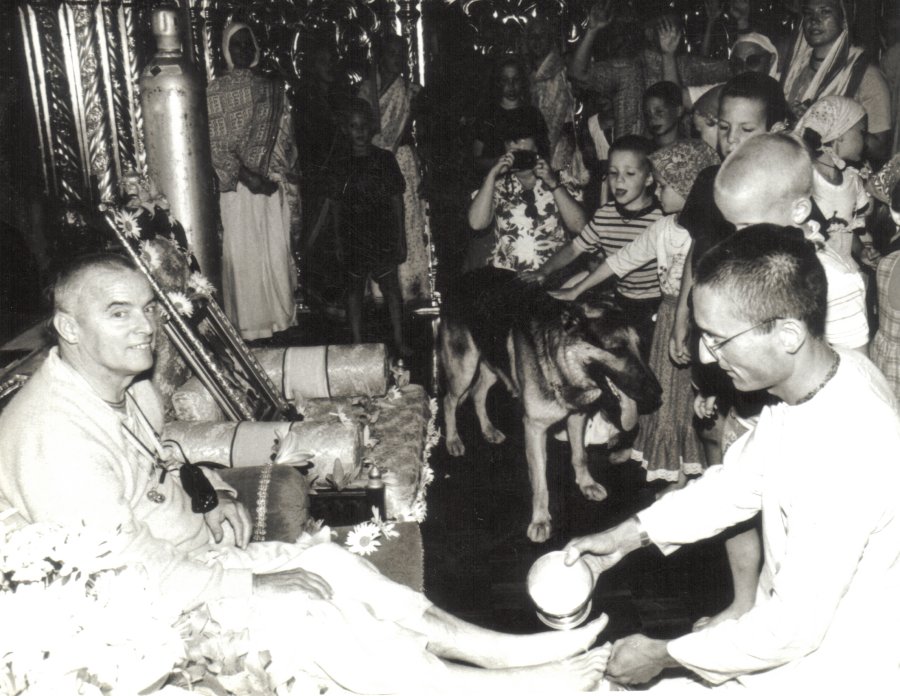
Hrishikesh performs pada-puja and bathes his spiritual master’s feet with yogurt, while Bhaktipada’s German shepherd guard dog Gudakesh enjoys affectionate petting from gurukula boys during Bhaktipada’s 50th birthday party (September 7, 1987).
Mahaprabhu refuses to send his daughter back to America
However weeks went by with no word from my future bride-to-be. Mahaprabhu appeared to be stalling. I later discovered that he did not want to send his daughter to America to marry me; he knew that ISKCON marriages between Western boys and Indian girls mostly ended in divorce. He wanted to spare his daughter from that humiliation.
I don’t think he had any personal vendetta against me. During his visits to New Vrindaban, we always had cordial relations. As I recall, we met for the first time when he visited my Palace Publishing office at Bahulaban probably in September 1985. At the time, it was not yet called Palace Publishing, but Bhaktipada Books. I did not know of his high position in India, working as an attorney for the Juhu Beach ISKCON temple, I just thought he was an Indian guest. So I put him to work, engaging him in Krishna’s service by moving heavy cases of books. Service to Krishna, I thought, would help purify his soul. Although he was nearly two decades my senior and walked with a limp, he complied.
When his three-month visit to New Vrindaban with his 20-year-old daughter had ended, I drove them to Pittsburgh International airport in a community van. Mahaprabhu sat in the passenger seat, and Shyama dasi sat in the back. For much of the trip, Mahaprabhu and I shared friendly and joking banter. Sometimes I insulted him in a friendly way, as male friends sometimes do, and we laughed. His daughter sat quietly in the back during the entire ride. I ignored her. I think this was the defining moment for her, when she decided that she wanted to marry me, or another man like me: I treated her father as an equal, not as a superior, despite his age. At the time he was 58 and I was 29. Shyama was 20.
Now back to the spring of 1986: When Mahaprabhu delayed in sending his daughter to the United States for our wedding, Bhaktipada told me, “Call him up again. Tell him if he doesn’t send his daughter over immediately, then he can find another spiritual master!” Bhaktipada threatened to reject Mahaprabhu as his disciple, if he didn’t obey the spiritual master’s instructions.
I relayed the ultimatum to Mahaprabhu by phone, and within a few weeks, Shyama dasi arrived at New Vrindaban. Mahaprabhu did not tell his wife why her daughter was coming back to New Vrindaban. He knew his wife would not approve of the marriage with me. She did not discover that her daughter was married until months later. This is unfortunately, as Indian weddings are week-long affairs with much pomp, circumstance, rituals, family participation and feasting.
When Shyama came to New Vrindaban, she moved in with an older woman in the women’s ashram on the second floor of the temple. Bhaktipada asked me, “Now that she’s here, when do you want to get married?” I answered, “Bhaktipada, we might as well get this unpleasant task over with quickly. There’s a big fire sacrifice coming up soon in a few weeks. Let’s get it done then.”
I notified my parents of my forthcoming wedding, and my mother, my sister Eileen, and my mother’s brother and sister-in-law (Uncle Frank and Aunt Joan) drove from New Jersey to New Vrindaban. I was actually embarrassed. I didn’t want to draw any attention to my new ashram designation: Hrishikesh dasa Adhikari. The fire sacrifice was enormous. There were 51 participants who took sannyasa, vanaprastha, accepted marriage, or first or second initiation. It lasted two hours, as I recall.
During the marriage part of the fire sacrifice, Gaura Keshava dasa ACBSP (Gregory Jay) served as priest. He appears in the photo below wearing a red chaddar and standing at my right side. The wedding ceremony was embarrassing for me. For about five minutes, we were the center of attention.
At one point Gaura Keshava tied my chaddar to Shyama’s chaddar. I guess that means we officially tied the knot. At another time, he told us to look into each other’s eyes. The other couples appeared to have no problem with this instruction. As I recall, a Hansadutta disciple and his bride got married with us, and my godbrother Dasarath (David Van Pelt) married Vrishni (Virginia). Those couples had absolutely no problem staring intently into each others eyes. But Shyama and I couldn’t do it, or at least I could not do it. I was so embarrassed that I averted my gaze. It took a tremendous amount of courage for me to look into her eyes, for only a second or two. I didn’t even want to get married! I was still a brahmachari at heart, I suppose.

Hrishikesh and Shyama dasi were married on June 4, 1986. I believe Bhaktipada arranged this marriage in part because he wanted to unite the east and the west by getting his American and Indian disciples married to each other.
Marriage in ISKCON
At New Vrindaban, as throughout ISKCON, arranged marriages were the norm. In most cases the husband and wife hardly knew each other. Some couples seemed to be well matched and appeared to be physically, emotionally and spiritually compatible, but many more New Vrindaban arranged marriages appeared to have been purposely mismatched in an effort to make the marriages “hellish.”
Vajresvari dasi (Ellie Singer-Clark), the daughter of the principal French horn player with the New York Philharmonic Orchestra, was a cultured woman, a modern dancer and peace activist before she came to New Vrindaban. She was matched by Kirtanananda Swami with a former Hell’s Angels biker. She described her marriage, “Marriages are arranged by a genius at arranging materially hellish situations. . . . I mean obviously (it has been said) if it wasn’t for the mahamantra, we wouldn’t, or better couldn’t, be within fifty miles of each other.”11 Another New Vrindaban resident, Mahamaya devi dasi, described her arranged New Vrindaban marriage:
I felt upset when I learned that Kirtanananda Swami wanted me to marry Tribanga dasa, a Spiritual Sky salesman working Indiana, lured to New Vrindaban by promises of a wife, house, maha prasadam [special foodstuffs offered directly to the deity] and whatever he wanted. . . . Although especially not wanting to marry him, I could see no way out. The next Sunday we were married at a New Vrindaban “flower ceremony,” in which we exchanged flowers on the temple porch at Bahulaban. Everyone cheered and considered us married. We were given the deities’ maha prasadam afterward. The marriage went downhill from that point. . . . It was embarrassing to be married to this man. My unforgiving feelings are most accurately described by a crude expression I learned while growing up: I hated his guts. . . . After eight months of hell, married to Tribanga, I decided to leave him.12
Bhaktivedanta Swami Prabhupada expected his disciples to obey his every order, even an order to get married. Whether or not a disciple liked their spouse should make no difference: the disciples’ only consideration should be how to please Krishna and the bona fide spiritual master. During an April 1972 room conversation, Prabhupada explained that the disciple must follow the order of the spiritual master, even in the case of entering into an arranged marriage with a spouse you know nothing about. Prabhupada noted:
You know our Jagattarini, wife of Bhurijana? She was a theatrical girl and earning millions of dollars,13 but she has given up everything. You have seen his wife, you all, Bhurijana’s wife? She is a nice girl, educated, qualified. But she is satisfied. I asked her to go and marry Bhurijana. He never saw her. She never saw him. What kind of husband she is going to accept? But simply on my word, she came, and she came from Los Angeles to Hong Kong14 and got married.
Similarly I am asking one [other] girl, she is a French girl, Mandakini. So I am asking her to go to Russia and marry one boy. She has never seen. So they obey in such a way. The [non-devotee] Western boys and girls, they want to see [their future spouse] and behave [nonsense] before marrying. But they [my disciples] are so obedient that without any consideration [they follow my order]. Because marriage or no marriage, that is not their consideration. The only consideration is how to please Krishna and his representative.15
Another time, Bhaktivedanta Swami Prabhupada praised the obedient wife of a householder disciple, “You have to take care of your wife. She has surrendered. On my word she went to marry you. She’s so nice girl. That is unique in the Western countries. She never saw you previously. Simply I told her, ‘Go and marry that boy.’ So she went.”16
Sadly, the result of forcing incompatible couples to wed only guaranteed a high divorce rate. James Grace, a professor of religion at Glassboro State College (today known as Rowan University) in Glassboro, New Jersey, noted, “The divorce rate [at New Vrindaban] makes the outside world’s look good.”17
Divorce erodes the stability of society and often causes children of dissolved marriages to experience emotional trauma. At New Vrindaban this was apparently considered a lesser evil than allowing a man to develop genuine affection for a compatible spouse and his children which often results from a happy marriage. The attached householder’s soul was believed to have been “killed.” Bhaktivedanta Swami Prabhupada himself had an unhappy marriage. Why should his disciples and grand disciples expect any better?
Unfortunately, the practice of purposely arranging mismatched marriages also blatantly undermined the establishment of varnashram dharma at New Vrindaban, because in Vedic society, as Bhaktivedanta Swami Prabhupada explained, members of the three renunciate ashrams—the brahmacharis, vanaprasthas and sannyasis—were dependent upon the charity given by householders for their support. If the householders were constantly thwarted in their attempts to form long-lasting marital bonds, varnashram society would be impossible to establish. Prabhupada explained, “The householder’s duty is to earn money because a sannyasi is not supposed to earn money but is completely dependent on the householder.”18
My wife, Shyama dasi, was in fact a very nice girl: she graduated from a high school for girls in Bombay taught by nuns; she had never dated a boy in her life, she was dedicated to Bhaktipada, and she had some leadership skills. She could often get people to do what she wanted them to do. When Bhaktipada visited Bombay, she was in charge of the kitchen and supervised the kitchen staff. She told her brahmachari assistants what to do: “You peel the potatoes.” “You boil water for the cashew rice.” “You boil milk for the burfi.” “You get flowers to decorate Bhaktipada’s thali (plate).” She made sure that Bhaktipada’s meals were sumptuous and ready on time. I think she really enjoyed being the boss.
Despite these admirable qualities, I was not attracted to her in a romantic or sexual way. This is simply a reflection of my own particular taste; it has nothing to do with her. I’m sure many others found her attractive. In fact, my wife and I didn’t have intimate relations until fourteen months after our wedding ceremony. (I’ll tell that story later.) She lived in the temple in a second-floor room with one or two other women, and I unrolled my sleeping bag every night and slept by myself on the floor in the choir rehearsal room. I was quite happy with that arrangement. We really didn’t spend much time together, although we sat together at the Sunday feasts. Enough back story! Now let’s return to the spring of 1987:
In the typesetting room at Palace Press, Ragamathani and I professed our love for each other, but I understood that our love must be kept hidden and never expressed in a physical way, as we were both married to other spouses.
After I spoke to her, Ragamathani came back into our choir, and all was well. I only saw her during choir rehearsals, or when we were rehearsing for a recital. Sometimes she brought a maha treat for me and left it on my desk in the choir rehearsal room. We never even so much as held hands, but it seemed everyone at New Vrindaban knew we were madly in love with each other. They could tell just by looking at us.
This caused a huge scandal. My wife especially was furious. But what could I do? Bhaktipada clearly said that Krishna’s service was the most important factor to consider, and Ragamathani was an important factor in the success of Krishna’s choir.
Deep in the well
As time passed, I began to resent my wife. Our affections were decidedly one-sided. Two years earlier, in the summer of 1985, Shyama had come with her father from India to New Vrindaban. They stayed for three months. She thought New Vrindaban was heaven on earth. She served Bhaktipada personally by washing his laundry. She especially enjoyed washing his Toyota Land Cruiser, spraying it with a garden hose and scrubbing off the mud. New Vrindaban, especially in the 1970s, was famous for its mud. Shyama really loved her spiritual master.
After Shyama returned to India, Bhaktipada told her in a letter that she could best please him by getting married, and by preaching “in the right way.” She then informed her girlfriends, “Bhaktipada wants me to get married! But I will not accept just anyone. I want to marry Hrishikesh, or someone like Hrishikesh.” Her girlfriends shared this confidential information with Bhaktipada during his next visit to Bombay, and Bhaktipada thought it was a good idea to get us married. It would help unite his Eastern and Western empires. In April 1986, he ordered me to marry her.
After falling in love with Ragamathani, I became passive-aggressive towards my poor wife. I wrote an article titled, “Deep In The Well, or Confessions of a Brahmachari-Grhasta.” I didn’t mention my name as author, but merely used the pseudonym “Anonymous.” The article was auto-biographical and told the story, from my misogynistic perspective, of my marriage. The names of the characters in my story were changed to protect the innocent, but everyone at New Vrindaban could tell I was the author. When I first penned the article, I gave it to Bhaktipada to read. He laughed out loud, and told me, “Tell Garga Rsi to publish it!” Garga Rsi (David Waterman) was the editor of the Brijabasi Spirit. My story appeared in the June 1987 Brijabasi Spirit. A second episode was published in the July issue.
The tenor of the series was extremely insulting to my wife, and women in general. I quoted many of Prabhupada’s negative statements about women, “Women are like witches. It is better to fall into a pit of hungry tigers than to look a woman in the face.” In my subconscious mind, I must have thought this was one way I could get back at my wife, who I regretted marrying.
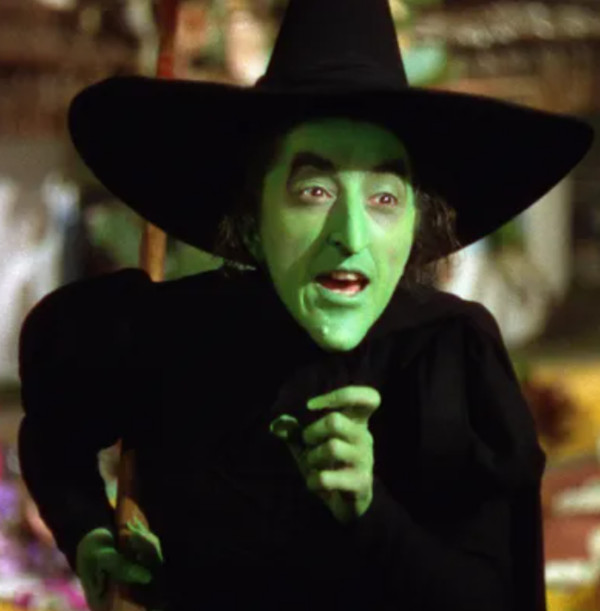
“During the day a woman is a witch. . .”

“. . . at night she is a tigress.”
I wrote a third episode in which I referred to my wife’s father (Mahaprabhu dasa) as “Maha Boo-Boo,” but Garga Rsi refused to publish it. He told me that my first two installments generated intense negative feedback from the New Vrindaban women, and he wouldn’t publish any more episodes.
The temple president orders me to start having sex with my wife.
One day, perhaps in July or early August 1987, the New Vrindaban temple president, Devamrita Swami (Lee Reynolds, AKA Jay Matsya), called me into his office. The New Vrindaban sankirtan devotees (pickers) referred to him as “The General,” but the New Vrindaban householders (married people) derogatorily called him “The Great Manipulator.” He asked me if I was having sexual relations with my wife. I was surprised that a sannyasi was asking me such a personal question, but I honestly replied, “No. I’m not very attracted to her.”
He then went into a long and intense monologue about fulfilling my duties as a Krishna conscious husband, and even warned that if I didn’t begin generating offspring my repressed sexuality would increase and increase and finally explode and I would start molesting gurukula boys. I was quite stunned by this insinuation. I had never had sexual feelings toward children, but I had heard that our former school headmaster, Sri Galim (Gary Gardner), had been charged with sex crimes with minors four months earlier. My wife and Sri Galim’s wife were best friends. Since then, Sri Galim had disappeared. Later I discovered he had been hiding from U. S. law enforcement in India and Malaysia.
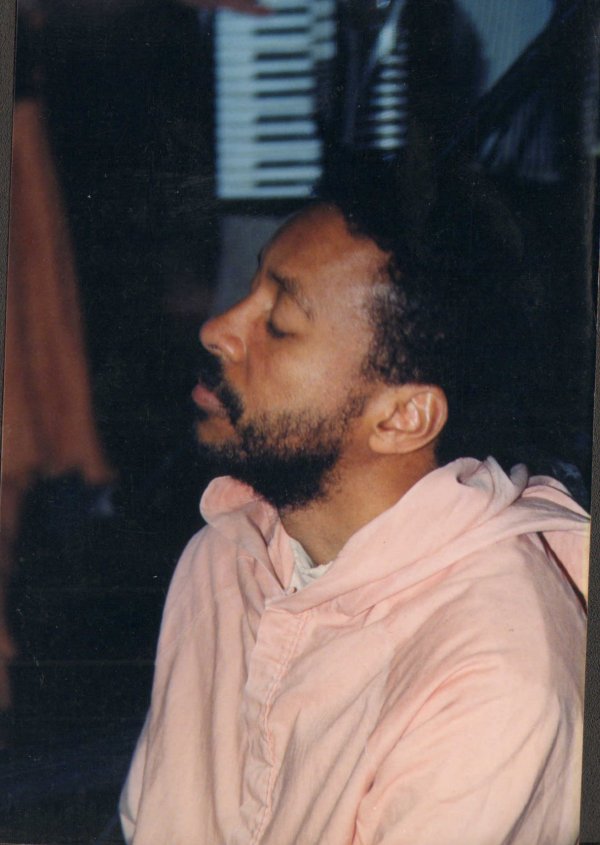
Devamrita Swami
Devamrita’s warning struck a nerve in me. I thought, “Maybe I should follow his advice. After all, he is the temple president and an advanced devotee. Bhaktipada seems to trust him, maybe I should also. If my wife and I produce a child, maybe that will strengthen our marriage, and help relieve the emotional stress from my powerful infatuation with our star soprano.”
In August 1987, my wife and I went on the pick together to New Jersey, and our first child was conceived. I had been a celibate brahmachari for nearly ten years.21 Once I started having sex again, I couldn’t stop. That first day we did it five times. (Isn’t it curious the things we remember from nearly 40 years ago?)
In the spring of 1988, in anticipation of our first child, my wife and I abandoned our single lifestyle and moved together into an apartment in the New Vrindaban Apartment Complex, located down the hill from the temple. Our life was mostly peaceful, but I still loved Ragamathani. Sometimes I wished I could take a second wife, like a few other New Vrindaban men (Ambarish, Adwaita, Murti, etc.), but I knew it wouldn’t work. My wife would not tolerate it, and it would be unfair to Ragamathani.
Forty Seasons
In the meantime, during the summer of 1988, our Krishna Chorale recorded two cassette tapes: Jagad Guru and Blessed Assurance. We hired Professor Alfred R. de Jaager, Director of Choral Studies at West Liberty State College, to rehearse and direct the choir, and I accompanied on piano and organ. Bhaktipada had recently purchased an Allen digital church organ (two manuals and pedal board) which was first installed temporarily in the temple room of his house. Later that year, we moved the Allen organ into the Radha Vrindaban Chandra temple room, where I played it during temple services for the next five years.
Some of the music which our choir recorded used organ accompaniment, and other pieces needed piano accompaniment. We recorded at Bhaktipada’s house for the music which needed organ. The pieces that used piano accompaniment we recorded at Gerrero’s Music store on 1039 Main Street in Wheeling (where Bhaktipada purchased his Allen organ) as they had a fine Baldwin concert grand piano in their showroom. My godbrother Vaikunthanath dasa (Wolfgang Arndt) operated the 10-inch reel Tascam tape recorder.
After all the tracks were recorded, I took the master tapes to Jaimie Peck’s Recording Studio in Weirton, West Virginia, to add more instruments to the mix, such as adding digital instruments to some tracks using my Kurzweil keyboard. We also added the men’s chorus and accordion on Song of a Brahmachari,19 and Ragamathani came up to sing in order to reinforce the soprano line for Handel’s Hare Krishna Chorus, and a piece I composed, a setting of a poem by Bhaktipada which was based on a sonnet by William Shakespeare. It was titled Forty Seasons.
I thought Forty Seasons was especially beautiful, and poignant. The text warns us not to become enamored by external beauty, as it will eventually fade away, “to unwanted weeds,” with “deep, sunken eyes,” as ephemeral beauty is “illusion, only a phase.” Ragamathani wore headphones during the recording session, as she sang the soprano part to Forty Seasons. Listening to her angelic voice singing the mahamantra during the final four refrains transported me to a celestial realm of peace and love and eternal bliss beyond time and space. It was like I was having an orgasm, hearing the sound of her voice, but it wasn’t sexual, it was within my heart. If I had died then, I would be content. Truly an amazing experience which I have not forgotten.20
Too close for comfort
In the summer of 1988, I enrolled for two week-long college courses at Westminster Choir College in Princeton, New Jersey: (1) Gregorian Chant with Father Gerard John Benedict Farrell of the Order of Saint Benedict (1919-2000)—a renowned authority on Gregorian Chant, and (2) Children’s Choir Conducting with Helen Kemp (1918-2015), the famous voice teacher, church music pedagogue, composer, and children’s choir clinician.
I suggested to Ragamathani, “Why don’t you come to Westminster Choir College and take some voice classes this summer? I’ll stay at my parents’ home in East Brunswick and you can rent a motel room in Princeton.”
By this time, Ragamathani had filed for and received a divorce from her husband. I suspect her settlement was hefty, as by that time, Dulal had purchased a brand new, large two-story home in a nearby suburban development. I’m not sure where Ragamathani was living during and after her divorce, but I think she was living in the temple. She thought taking voice classes in New Jersey was a good idea. We drove separately: I in my Toyota pickup truck, and she in her Jeep during our 390-mile journey.
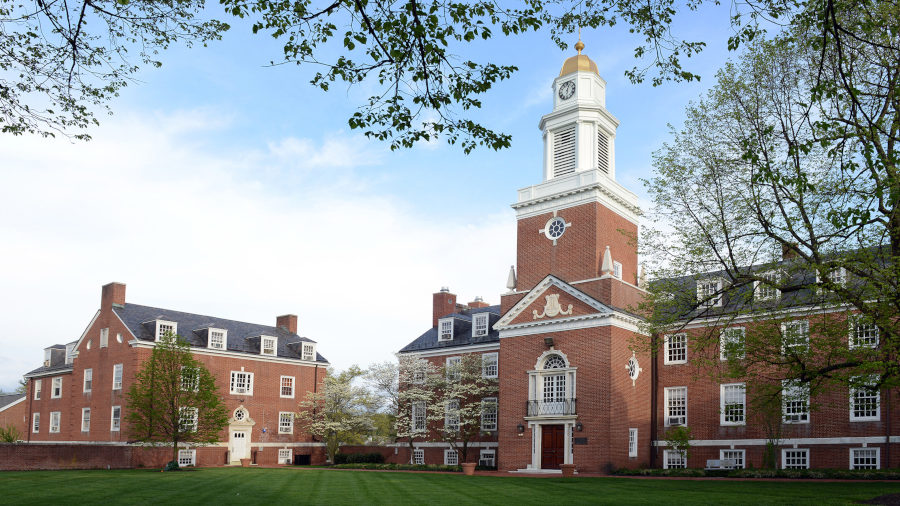
Westminster Choir College.
In New Jersey, every morning I’d pick her up at her motel and we’d drive to Westminster Choir College. After the morning class, we’d have lunch together, and when our afternoon class was finished, we’d have a bite to eat, and I’d drive her back to her motel. I never dallied or spoke nonsense with her. Both of us were very well behaved, befitting our position as upstanding Krishna devotees.
However, after the last day of class (Friday), when I dropped her off at her motel, she invited me inside her room. She sat on the bed and looked at me sweetly, with lips slightly parted. I think she wanted me to kiss her. Not wanting to get in any trouble or jeopardize my standing as a good New Vrindaban householder, I leaned over, gave her a quick peck on the cheek, said, “I gotta go!” and turned and walked out the door. I got in my pickup truck and drove off to my parents’ house.
The following morning, I met her in the parking lot of her motel, she packed her Jeep, and we drove back to New Vrindaban in a two-vehicle caravan.
However, the next few days were emotionally stressful for me. I remembered our kiss with great affection, and I felt bad that I had acted contrary to scriptural injunctions. Kissing a woman, even a peck on the cheek, is a sinful activity, no matter how you look at it.
I really wished I was married to Ragamathani, and now she was single again and available! I began to resent my wife even more, although I knew that was not an admirable emotion. It wasn’t Shyama’s fault that I fell in love with another woman. It was my fault in the first place, for agreeing to marry someone I was not attracted to. What to do now?
Expelled from New Vrindaban
The next time I visited my spiritual master in his office at this home, I told him what happened during our trip to New Jersey. Bhaktipada asked, “What do you want me to do about this?” I said, “One of us has to leave New Vrindaban, me or her. I can’t focus, I can’t concentrate. My mind naturally and inexorably gravitates to her. I don’t have the strength to resist her female charms. Eventually, if this continues, both of us will have to leave New Vrindaban, get married, and move in together somewhere else.”
After our conversation, Ragamathani left New Vrindaban and I didn’t see her again, at least not for six years. She was heartbroken, but what could she do? She was disturbing an important member of Bhaktipada’s plan to Westernize Krishna consciousness and start a Reformation. She was only a lowly typesetter at Palace Press. Bhaktipada knew who he needed more to push on his mission.
Eventually I forgot about Ragamathani. Out of sight, out of mind. I heard she moved into an apartment in Moundsville, and my wife told me she had an affair with Raghunath (Ralph Seward), who was married to Jamuna (Jane Seward). A few years later, I gave piano lessons to their children.
After some time Ragamathani moved down to Florida where she shacked up with another former Palace Press employee: Indra Pramada dasa ACBSP (Elliot Cohen). After a time, she moved to Southern California and had a romantic relationship with Muralidhara dasa ACBSP (Mark Missman), who was revered as ISKCON’s greatest artist. He had left ISKCON some years earlier. Now he paints for a living, and goes by the name Mark Arian. He has made a name for himself as a master of the “Poetic Realism” style, which his promoters claim “captures the subtle interplay between the tangible and the spiritual.”

“Cherubs,” a painting by Mark Arian which Ragamathani gifted to me.
The foundation collapses
Fast forward to September 30, 1993 when I confronted my spiritual master at a private darshan in his Silent Mountain cabin and concluded that he had been giving fellatio to New Vrindaban teenage boys for many years, and didn’t want to stop. I rejected him as my spiritual master and stopped serving his mission. RVC Swami would have to play the temple pipe organ at the morning, noon and evening services from now on.
However, when I rejected Bhaktipada as my spiritual master, my marriage lost its foundation. During seven years of marriage, I kept telling myself, “Bhaktipada’s a pure devotee of Krishna. When he speaks, it is really Krishna speaking through him. There must be a very important reason why he ordered me to marry this particular Indian lady.”
But now that I understood that Bhaktipada was simply a conditioned soul subject to the four defects of material life, and a lying, cheating, cock-sucking pedophile to boot, I thought, “Perhaps Bhaktipada made a mistake in ordering me to marry this girl.” It became more difficult for me to remain in this marriage, even though we had two wonderful children.
In late November 1993, I moved temporarily to Pittsburgh, Pennsylvania, and slept on the sofa in the apartment of my friends George Exoo (1942-2015), a gay Unitarian minister who used to live at New Vrindaban, and my godbrother True Peace/Thomas McGurrin (1941-2015), a fine poet who had translated Chaitanya Mahaprabhu’s Siksastaka Prayers into rhymed English poetry for our Noon Service, which I then set to music.
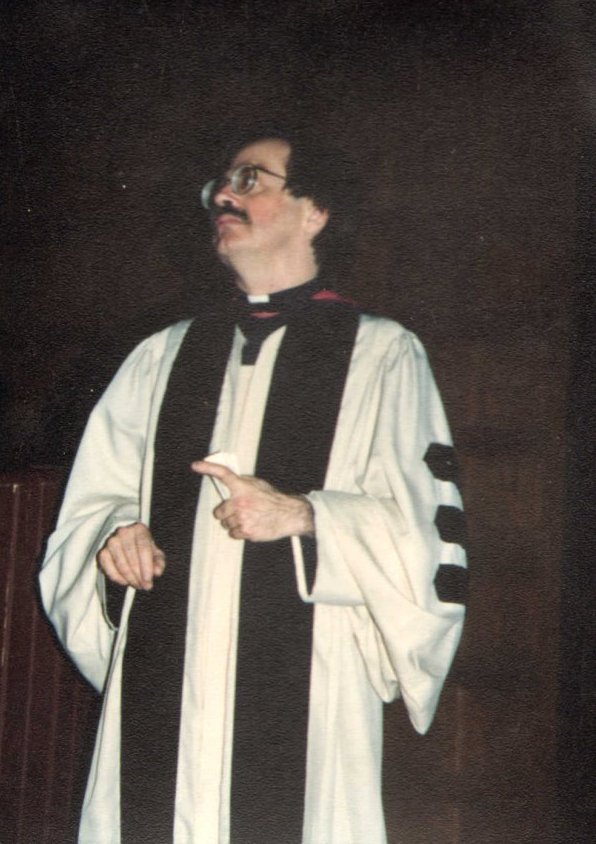
City of God Interfaith member and Unitarian Universalist Minister Rev. George David Exoo (February 1991).
A Classical Christmas
I lived in Pittsburgh because my first compact disc, A Classical Christmas, had just been released. I mailed 400 copies to classical radio stations and newspapers in the United States and Canada. Many radio stations played tracks from my CD. Some radio stations today—32 years later—still play tracks from that same CD during the Christmas season. The Washington Post said my CD was “the most interesting instrumental collection of Christmas music this year.” The Detroit Free Press claimed, “This is a real find. . . . It’s really quite wonderful, with saucy settings of Jingle Bells and delicious variations on the Coventry Carol. Once you hear this one, it will be one of the most popular in your holiday collection.”
I was doing the pick (selling my CDs) on the sidewalks of Pittsburgh streets. I made good money, as many shoppers were looking for a unique Christmas gift, and my CD was chock full of 23 Christmas tunes. Many people had heard tracks from my CD broadcast on WQED-FM radio. And my picture playing the accordion (with the first chair violinist and first chair harpist of the Pittsburgh Symphony Orchestra) was on the cover. I signed my name on the CD booklet cover for hundreds of customers.

A Classical Christmas CD cover, with Huei-Sheng Kao, Gretchen Van Hoesen, and Henry Doktorski, from the original 1993 Soli Deo Gloria release. My godbrother Kumar (Craig Thompson) took the photo.
We get back in touch
During this time, I had a phone conversation with my friend and former New Vrindaban choir member, Bhavisya devi dasi (Belinda Hymes), whose photo appears above. She mentioned to me that she had the phone number of “our old friend,” Ragamathani. Although I wrote down the number, I hesitated to call her. Perhaps, I thought, I should just let it ride.
But while doing my CD pick on Walnut Street—the upscale shopping district in Pittsburgh’s Shadyside neighborhood—I happened to hit up a very empathic older woman who appeared to sense that I was hiding some emotional distress under my cheerful demeanor. She asked me about my life, and I opened up and told her all about my relationship with Ragamathani. After I finished speaking, she advised me, “I’ve been around for a lot longer than you, and I can tell you that a relationship like that only happens once in a person’s life. You should go for it!”
I called Ragamathani on the phone and we chatted for some time. She was living in a small apartment in Encinitas, California, about a five-minute walk from the Pacific Ocean. She had changed her name to Raechel Morgan. I called her about once a week, and our romance rekindled. At this time she was dating Muralidhara, but it seems that was not working out so well, and she would prefer to have a relationship with me, if possible.
After Christmas, the Pittsburgh shopping malls emptied, the temperature dropped, and the winter snows fell. My CD pick was no longer viable. On January 16, 1994, I drove to much warmer Miami, Florida where I could still do my CD pick at the resorts and bars and streets in the tourist districts. One day I drove to Key West to work the bars and tourist spots. I stayed with my godbrother Maitreya Muni dasa. Of course, at this time, I was making money not for the New Vrindaban community, but for myself and my family, as I had rejected Bhaktipada three months earlier. During my 10-day stay in Miami, I sold 75 CDs and made $1,376.
After a couple weeks, the Miami tourist areas got too hot for me to work, as I got nipped too many times by security and police officers, and I had to let the place cool down before I got arrested. I thought, “Where else in the U. S. is the weather warm enough so I can continue my outdoor CD pick?” On February 4th I purchased a round-trip American Airlines flight from Miami to San Diego for $408 to work Old Town, Seaport Village, the La Jolla downtown, and other tourist areas in warm and sunny Southern California. I called Ragamathani, who lived only about a 30-minute drive from San Diego. She invited me to stay with her at her apartment.
Revving up in high gear
Our reunion was very emotional, to put it mildly. We clearly still had great affection and chemistry for each other, despite not seeing each other for more than five years. I was 38, she was 37. In Encinitas we had a whirlwind romance. She seemed to be the perfect mate for me.
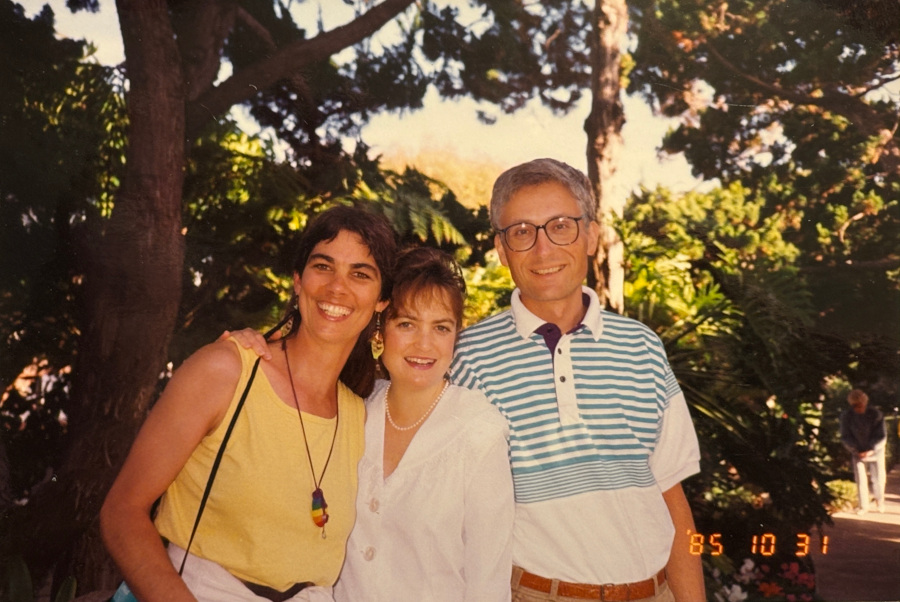
Ragamathani (center) with one of her girlfriends and Hrishikesh, Encinitas, California (February 1994).
I’ll never forget the time, while sitting on the sofa in her living room, when we listened to the local classical music radio station. They were playing J. S. Bach’s “Chaconne” from his Partita for Solo Violin, No. 2. It is a monumental and powerful work of art. Violinist Joshua Bell has said the Chaconne is “not just one of the greatest pieces of music ever written, but one of the greatest achievements of any man in history. It’s a spiritually powerful piece, emotionally powerful, structurally perfect.”
The great German composer Johannes Brahms, in a letter to Clara Schumann, described the piece, “On one stave, for a small instrument, the man [Bach] writes a whole world of the deepest thoughts and most powerful feelings. If I imagined that I could have created, even conceived the piece, I am quite certain that the excess of excitement and earth-shattering experience would have driven me out of my mind.”
While listening to the music, I became overpowered by emotion. My body began to tremble, my voice choked up, and tears poured from my eyes. Sometimes this happens to me when I listen to a piece of exquisite and profound music; I have an immediate and powerful emotional response. The music touches my soul and creates ecstatic feelings. It’s not a frequent event, but it happens from time to time.
I was more amazed, however, by Ragamathani’s reaction to my unexpected trembling. When I began exhibiting ecstatic symptoms, she quietly sat down on the floor by my feet, and held my feet on her lap. It was the perfect response. She understood my feelings and reciprocated in a wonderful, loving way. I have had this same emotional experience in the presence of other women, and none of them, with the exception of my current wife Cindy, understood my feelings or knew how to react when I experienced ecstatic feelings. Sometimes I get these same feelings when I describe Krishna’s childhood pastimes to others. Something about the deep love which the residents of Vrindaban feel for their darling child, friend or lover touches my heart.
I stayed with Ragamathani for two weeks in February 1994, and it was one of the most magical times in my life. I felt we were extremely compatible, even soul mates. She gave me a huge, framed print of a painting of two cherubs by her previous boyfriend, the artist Mark Arian, which I later took home and put up on the wall in my living room. I bought a ring for her, something like but not quite like, an engagement ring. On Sunday, February 13th, we drove two hours east to Palomar Mountain, elevation 6,142 feet above sea level. We played in the snow, took a few photographs, and enacted a “Ring Giving Ceremony,” during which we professed our love for each other.
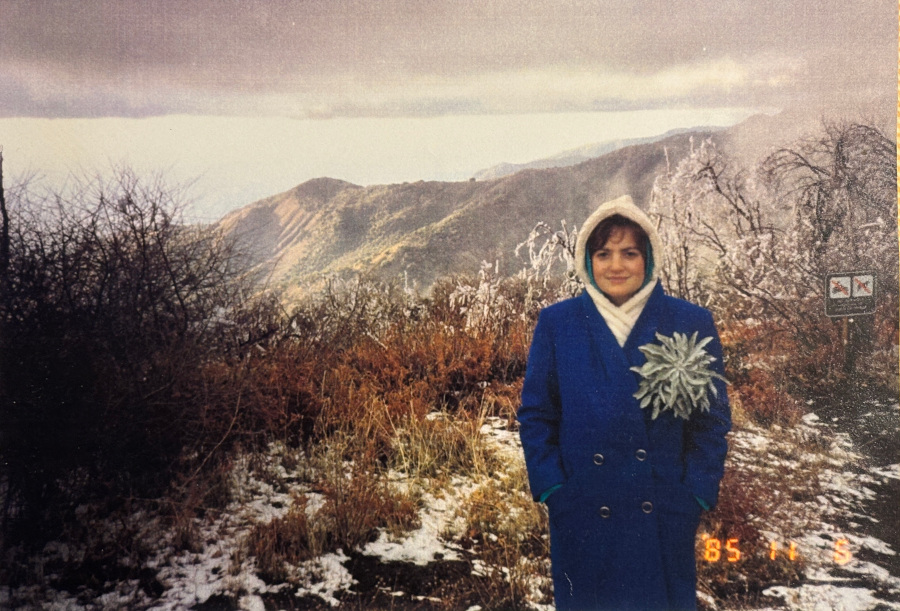
At Palomar Mountain (February 13, 1994)
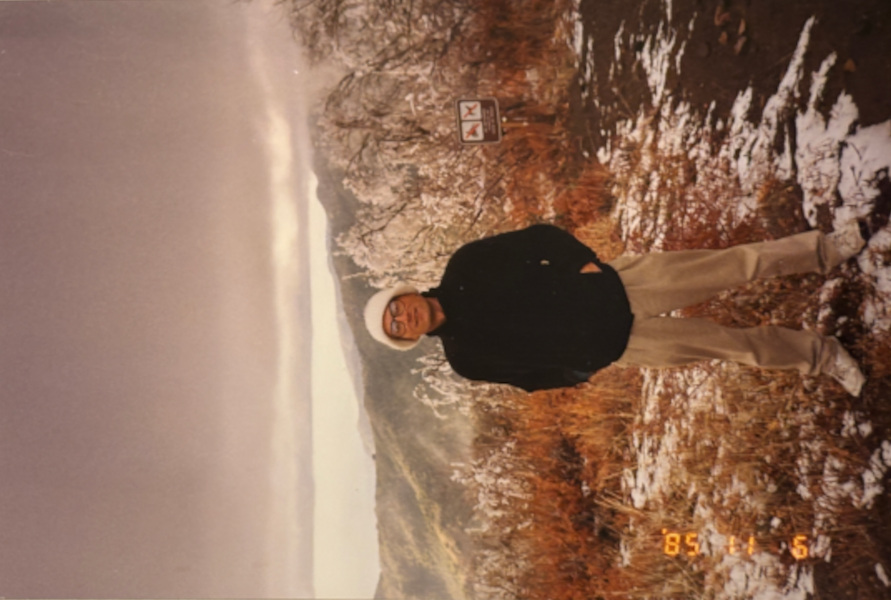
At Palomar Mountain (February 13, 1994)
I was in California 16 days, but only went out picking for eight days. During those eight days I sold 32 CDs and made $535. When I departed on my flight back to Miami on Sunday, February 20th, Ragamathani told me, “Hrish, you know if you want to continue to have a relationship with me, you have to get a divorce.”
I hadn’t thought about that, but yes, she was correct. I replied, “Please wait for me. It may take a year for me to extricate myself from my current situation, but I’ll work on it.”
I wouldn’t think twice about getting a divorce, but I had to think of my two children, ages five and one. I wouldn’t mind moving to California (I always liked my visits to California), but I did not want to be so far away from my children. I wanted them to be an important part of my life, and I wanted to be an important part of their lives. I wouldn’t want them to grow up with an absent father. What was the solution to my predicament?
Trip to India
In the meantime, my wife and I had planned a trip to visit her parents in Bombay. She left with our children on January 12th on a 2 pm flight from Pittsburgh to New York City, and from there to Bombay. From Miami, I drove back to our home at New Vrindaban, arriving on Tuesday February 22nd. Two days later, I flew from Pittsburgh to John F. Kennedy International Airport in New York City, and then got on a 17-hour international flight to India, which arrived in Bombay on Saturday February 26th just after midnight, India time. I stayed with my wife and two children in her parents’ apartment in Khar, just north of Bombay, near the train station.
On Saturday March 5th, my wife, two children and I got on a train to Delhi, and then to the town of Vrindaban, where we stayed in a guest room at the ISKCON Krishna Balarama Mandir Guest House. We planned to spend only three days in Vrindaban, but I was so charmed by the atmosphere, that I stayed three weeks, while my wife and children took the train back to her parents’ home in Khar.
During this time, I met one of my traveling sankirtan friends, a disciple of Satsvarupa dasa Goswami Gurupada named Sacinandan who lived in New York. We connected, and shared our heartfelt feelings. He was in love with a girl in New York, although temple authorities forbid them from getting married, and I was in love with a girl in California. We encouraged each other to follow our hearts.
“Hell hath no fury like a woman scorned”
On March 31st, I flew back to America. My seat was located in the back of the plane, in the smoking section. I got sick from inhaling non-stop cigarette smoke for 17 hours, and was ill for two weeks. Soon after returning to our home in New Vrindaban, I confessed to my wife about my affair with Ragamathani in California. She was furious. She told me that she was going back to India permanently, with our children, and I would never see my son and daughter again. Then she ordered me to get out of the house. I forgot where I went, probably to a friend’s house. I stayed there maybe a couple weeks.
I still spent a great deal of time with my children, visiting daily. My wife wanted to save our marriage, and she thought I must be crazy to want to divorce her for some floozy. She asked me to see a marriage counselor, and I agreed. I figured it couldn’t hurt. Devamrita Swami, once again, called me into his office to counsel me. He said, “When one is driving through a fog, one shouldn’t make sharp turns.”
I still talked to Ragamathani on the phone, but she was getting tired of waiting for me. She seems to be the type of woman who needs a man in her life. I understand perfectly, as I am the type of guy who needs a woman in my life. On May 17th, I went for my first counseling session with a professional therapist in Moundsville, and in my diary noted, “My last phone call with Raechel.”
All this counseling only served to confuse me. I knew for a fact that I was in love with Ragamathani and wanted to live with her. I also knew that I would not abandon my children. No matter how hard I tried, I couldn’t see a solution to my dilemma. Perhaps there wasn’t a solution? If push came to shove, I would have to stay with my children. I decided to bide my time and wait to see if Krishna might provide some inspiration or realization to me. In the meantime, I would continue the counseling, to show my sincerity.
I move to Pittsburgh
On May 22nd, I permanently moved to Pittsburgh, Pennsylvania, where I thought I could make a living as a musician. It was only a 90-minute drive from New Vrindaban, and I could still see my children frequently. I rented a room in the spacious Squirrel Hill house owned by Bernard Goldberg, the principal flutist for the Pittsburgh Symphony Orchestra, and conductor of the McKeesport Symphony. I was amused by his practice habits. Every day, he’d lay back on his sofa with his feet up on a cushion, watching television, with his flute at his lips. It made me laugh: terribly poor posture, distractions, little concentration, but still he was a great first-chair flute player!
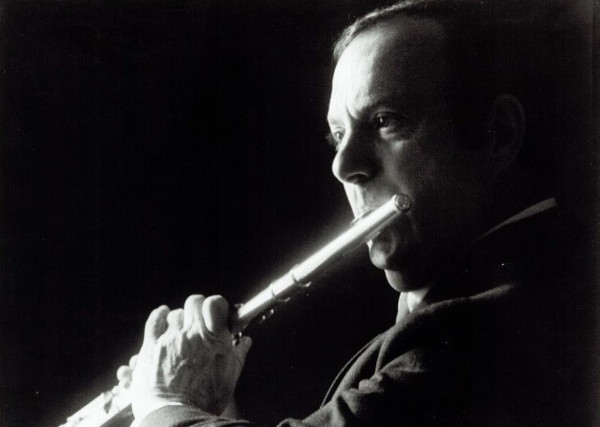
Bernard Goldberg (1923-2017)
In Pittsburgh I made money on the pick by selling my CDs on street corners, and also got a few gigs playing accordion, piano and organ. I auditioned for a few organist positions at churches, but didn’t get hired, not yet. I rented a studio apartment in a house on Ivy Street in Pittsburgh, near the Shadyside business district, where I hawked my CDs. I recall the rent was $350 per month.
On the first of each month, I often wondered how I was going to pay my bills, as I didn’t have a steady income. But at the end of each month, all my bills got paid, as if by magic. Krishna was taking care of me, I thought. That year (1994) I sold 1,466 CDs, 82 cassettes, and collected $34,009 in tax-free cash dollars.
I was gradually making a name for myself as a classical accordionist. Pittsburgh’s classical radio station WQED-FM broadcast tracks from my CD on the air, and I also appeared as a guest musician on their shows from time to time. On June 5-6, a feature article by WWVA radio’s DJ Dave Demerest about my A Classical Christmas CD won first prize in the the West Virginia Associated Press Broadcasters’ Convention.

The author with his Rivoli Sonola accordion (publicity photo, c. 1989).
After seeing the marriage counselor a half-dozen times, my wife mellowed out a bit, and I took her out for her 29th birthday (July 20th) for dinner at Stratford Springs, a swanky restaurant in Wheeling. Although I lived in Pittsburgh and played piano, organ and accordion at free-lance gigs, my wife and I still went out from time to time on dates, and even enjoyed quality time in bed, although I’d close my eyes and pretend she was Ragamathani. On August 19th, my wife visited me in Pittsburgh. I wrote in my diary, “S. comes to visit. Last sex w/Sh.” (I thought it was our last time, but it wasn’t.)
Although most of the time we got along okay, we were not really a very compatible couple. I was not happy being married to her, and she was not happy being married to me. How could she be? Her husband was in love with another woman.
Once a visiting family from India came to visit New Vrindaban and they came over to our house for dinner. Shyama introduced our son and me to our guests: “This is my son, Siddhartha. He is three, going on four. And this is my husband, Hrishikesh. He is thirty-nine, going on four.”
Two days later, I came to Wheeling to meet our marriage counselor. I received my Psychological Evaluation, which indicated I had several major emotional problems, such as Borderline Personality Disorder and Narcissistic Personality Disorder. Apparently, they thought that was the reason I didn’t love my wife. I was messed up in my mind, or so the experts claimed.
That evening I went back to New Vrindaban and burned two cases of Bhaktipada’s 1993 Vyasa Puja books which were stored in our basement. I had edited and produced that book for Bhaktipada’s Vyasa Puja festival in September 1993, right before the Winnebago Incident, when he was caught in a compromised position with his teenage dark-skinned male Malaysian personal servant. Burning those books was a liberating experience. I had rejected Bhaktipada as my spiritual master ten months earlier, but I still carried the weight of my love for him. Finally, my heart was at peace with my former spiritual master. I had thrown off his influence, and now I was free again to be myself.
On the same day, I wrote in my diary, “I have chosen my mate.” This meant Ragamathani. After reading my psychological evaluation, I decided that the counselors didn’t understand me or my situation. From my viewpoint, I had been tricked by Bhaktipada into agreeing to an arranged marriage with a girl I didn’t want to marry (allegedly for spiritual advancement), and 14 months later, I was tricked by Devamrita Swami into consummating my marriage and producing children. I decided that if I was going to be married, I wanted to be married to someone who I wanted to be married to.
A few days later, on August 26th (Ragamathani’s 38th birthday), I told my wife I was going to file for a divorce. She responded by punching my head and boxing my ear with her fist. On the same day, I registered to take classes at Duquesne University’s Graduate School of Music so I could get a Master of Music degree. I still went to counseling in Moundsville, but they couldn’t get me to change my mind. On September 17th, I wrote in my diary, “Last phone call w/Raechel.”
It appears that my wife began trying a new tactic in hopes to get me to stay married to her, and suddenly she began initiating sex with me. She must have taken some lessons from some of her more-experienced girl friends, because the improvement in bed was stunning. She actually seemed to experience orgasms. On September 25th, I wrote in my diary, “S with S. 6x.” However, a couple weeks later, on October 6th, I wrote, “Last sex w/S.” (Or so I thought; but not true, we did it again later.)
We still went to see a marriage counselor, but on June 1, 1995, I told her (again) that I wanted a divorce. The next day, we met with our marriage counselor, Terry Slovensky.
My hopes are dashed
One month later, on July 9, 1995, I flew to Los Angeles to attend the annual Self Realization Fellowship Conference. After leaving New Vrindaban I had read Paramahansa Yogananda’s book Autobiography of a Yogi, and I often visited the SRF meditation center in Pittsburgh for their Sunday morning lecture and meditation. When I got a permanent position as a church organist I stopped attending the Sunday meditations as it conflicted with my work. I called Ragamathani on the phone and asked if we could meet sometime during my California trip. She agreed. My pilgrimage to the SRF convention had some amazing moments, which I will discuss at another time.
On Sunday July 16th, I met Ragamathani at a pond in a public park in Encinitas. We hadn’t seen each other since we professed our love for each other during our Mount Palomar Ring Ceremony a year and five months earlier. I gave her a green malachite beaded necklace. She explained that she was in a relationship with her boss, the owner of an aquaculture company. She had been hired as his secretary, and one thing led to another, and now they’re engaged. She wanted to return the necklace, but I told her, “Keep it. You can give it to someone else.” That night I wrote in my diary, “It is finished. I pray: Lord, take her out of my heart.” I sat alone with my breaking heart outside the SRF hermitage in Encinitas and watched the sun set over the Pacific Ocean.

A malachite necklace.
My divorce with Shyama was granted by the Circuit Court of Marshall County, West Virginia on October 10, 1995. We split our assets fairly. Neither of us wanted more than our fair share. My wife got: the Ford Escort, the altar in our house, the Radha Krishna and Prabhupada deities, the television, the VCR, the stove, the stereo, the washing machine, our encyclopedia, our Srimad-Bhagavatam and Chaitanya Caritamrita books, her Herbal Life Business, our daughter’s violin, jewelry, tools and power tools.
I got: the Suzuki Swift automobile, my accordions, computer, a second stereo, the microwave oven, music books, music copyrights, and the sofa. On Sunday, October 16th, I wrote, “I learned how to love myself. Very significant.”
I paid monthly child support payments to the West Virginia Bureau for Child Support Enforcement Agency for my two children until they turned 18. I paid every month without missing a payment for eleven years for my daughter, and fifteen years for my son. I also paid alimony to Shyama, for the rest of her life, or until she married again. I was so happy when she finally married again (after nearly 15 years of monthly alimony payments) on January 31, 2009. Not just because I didn’t have to pay alimony anymore, but I was glad she found a husband who would be a good, faithful husband. Not a rascal like me. I wanted to come to the wedding in Wheeling, West Virginia, as dozens of my Krishna friends would be there, but she wouldn’t give me permission. So I stayed away.
I always enjoyed spending time with my children, and I especially enjoyed traveling with them on vacations. I always loved my family’s vacations when I was a kid, and I wanted my children to experience the same. We visited my parents in East Brunswick, New Jersey several times a year, usually during Easter, Thanksgiving and Christmas. Our itinerary was fairly extensive.22 My two children are very dear to me, although I do not see them often anymore, as they have their own lives and reside 2,400 miles and seven states from me.
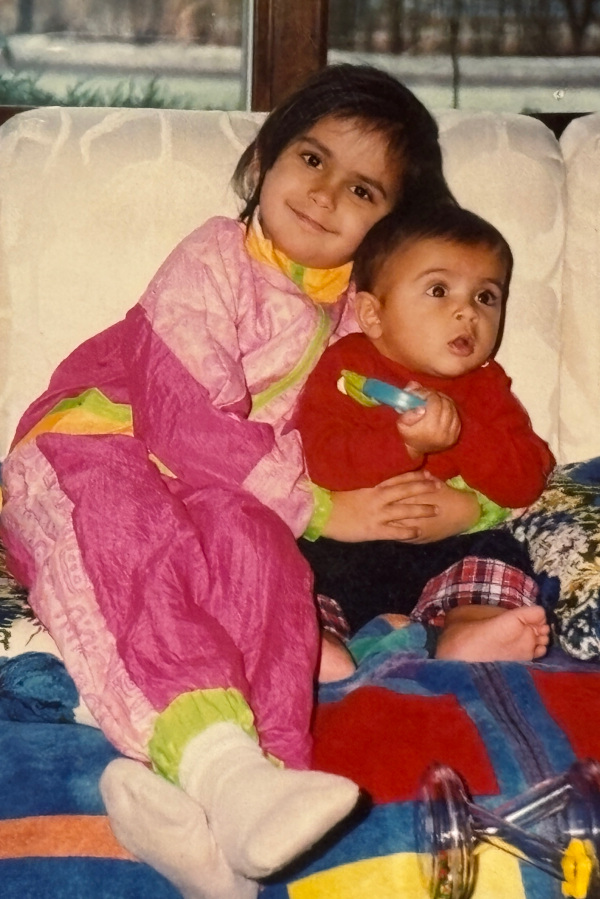
The author’s daughter (four years old) and his son (seven months) visit their grandparents in New Jersey for the Christmas holidays (December 1992).

The author and his two children during a visit to New Jersey (c. 1997).
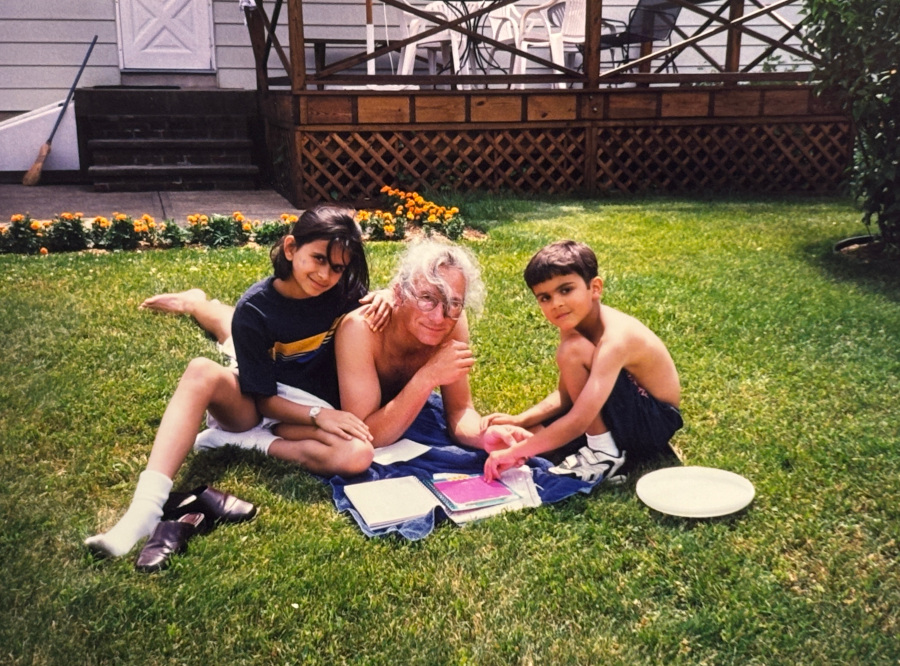
The author and his two children in Henry’s parents’ backyard in East Brunswick, New Jersey (c. summer 1997).
I never heard from Ragamathani again, until June 2001, when my new wife (Mary Kay) received an unexpected email from my old, forgotten flame: “Hrish, congratulations on your marriage. Mine has just ended.—Raga.” Mary Kay was curious, and showed me the email. I thought it weird that Ragamathani sent it to my newly-wedded wife. What was going on in her head? Perhaps she thought that sending me a personal message might be seen as too forward or provocative? I wonder how she found Mary Kay’s email address. Neither Mary Kay nor I responded.
Nearly twenty years later, in March 2020, I found myself living in California, and in between relationships (again). I happened to see an obituary for Ragamathani’s father in the New York Times, and sent an email to her father’s wife, an artist, asking her to forward my message to her step-daughter. I sent the message to the Seattle art gallery which sold her paintings, but I never received a reply. During a Google search I did find a news video from a Santa Rosa California television station, in which Ragamathani was interviewed. Something about a murder, if I recall, in her apartment complex, but I never bothered to find out more about her.
I sincerely hope Ragamathani is well and happy. I will always love her. I find that for every woman that I’ve fallen for, I always have great affection for them, even decades later, although we may choose not to keep in contact. For me, romantic love doesn’t turn to hate, it merely mellows out into (mostly) fond memories. I suppose this essay is a tribute to Ragamathani’s memory. Pax.
About a year after my attempt to contact Ragamathani, in April 2021 I met a terrific woman who lives in Ramona, California. We went mountain biking on our first date. We’ve been together for nearly 5 years, and I hope we will stay together until death do us part. Although we have our differences of opinion on certain subjects, we seem to be a very compatible couple. I am dedicated and devoted to her, and she to me. It’s nice to have a loving relationship, (relatively) free from drama.
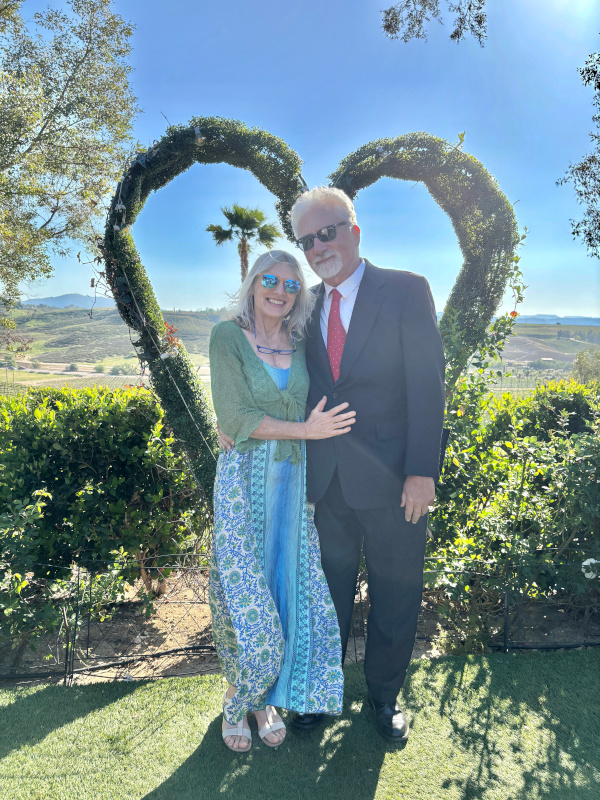
Cindy & Henry at Falkner Winery, Temecula, California, during the wedding reception for Henry’s niece and her new husband (April 13, 2025).
Regarding my first wife, Shyama, we don’t communicate much. Hardly at all. When our children were little, I’d see her frequently, but when our kids became high school age, they preferred to hang out with their friends rather than their father.
When Shyama’s husband retired from his job with a Pittsburgh phone company (Verizon, I think), they sold their house in Wheeling, West Virginia and moved to Asheville, North Carolina, to be closer to our daughter and grandchildren. When I visit my daughter and her family, I usually see Shyama and sometimes her husband. We chat amicably, but I get the feeling I’m not exactly their favorite person. Of course, that’s to be expected. I was a pretty terrible husband, I guess. Shyama didn’t know what she was getting into when she married me, and neither did I.
Concluding remarks
I’m sure you have noticed that this essay is very personal. Yes, it is. Some may like my story, and I’m sure others will not. Should I have changed the names of the people in this story? Perhaps. But on the other hand, in a few years, we’ll all be dead and it won’t matter any more. In my defense, I admit that my personality is such that I do not have the same rigid boundaries regarding what is acceptable and what is not acceptable during social interactions, which most people have. Normally I can talk about and share my experience regarding intimate topics easily. Very little embarrasses me. I like it that way, although some others may not understand.
I’m sure my daughter would tell me, “TMI, Papa! TMI!” (Too much information.) In reply, I might say, “Dear daughter, you haven’t seen what I left out of the story! You might faint if you saw the original un-edited version.”
What’s the lesson in this story? IS there a lesson? Perhaps, or perhaps not. In any case, I sometimes wonder, if I knew back then what I know now, would my life-changing decisions have been different?
Would I have joined the Hare Krishnas, if I knew my spiritual master was a chronic pedophile? (No.)
Would I have married the girl whom Bhaktipada ordered me to marry, if I knew in a few months I would meet the love of my life? (No.)
Would I honor Devamrita Swami’s instruction to begin having intimate relations with my wife, if I knew the woman I adored was going to be single again in less than a year? (No.)
Would I have abandoned my children and moved to California to be with the love of my life? (No, but I didn’t do that anyway.)
It’s hard to say. We cannot know the future. We can only know the present and the past. Perhaps, if I knew then what I know now, I might have done everything exactly the same. After all, two wonderful human beings were created from the union of Hrishikesh and Shyama. Who knows what may happen in the future? Perhaps one of my grandchildren might discover a cure for cancer, or invent a way to generate fusion energy cheaply, or become a great diplomat and work tirelessly to end war. Who knows? If that comes to pass, all the emotional suffering Shyama, Ragamathani and I endured might be worth it.
For one, I am extremely proud of my two children (currently 37 and 33 years of age) who turned out to be a credit to our species, in my humble opinion. For me, they are like a silver lining on a dark storm cloud. In any case, the past has passed, the present is here, and the future is yet to come. If there is a lesson here, perhaps it is: “Stay away from charismatic cults!” I intend to do just that, and I suggest you do too.
Henry Doktorski
November 17, 2025
Temecula, California
Endnotes
1. In Gen Z slang, “edge” or “edging” means almost reaching a limit or goal, but stopping just short of it. A person might say they were “edging 60 mph” to mean they were driving at 59 mph, just below the speed limit. In other contexts, it can also refer to sexual stimulation to the point of climax, then starting and stopping again, to delay orgasm for a period of time, in order to build towards a more intense orgasm later.
2. William Smith had four children: Mark, Gregory, Matthew and Rebecca.
3. The Sanskrit word raga refers to a melodic framework in Indian classical music, similar to a scale or mode in Western music, but with more specific rules about how to use them to create a particular mood or emotion, including specific patterns for ascending and descending notes. The word Mathani is a traditional Hindu name for a girl, which means “one who repeats or duplicates tasks frequently.” According to numerology, a girl with this name is “artistic, outgoing, playful, a great communicator and entertainer.”
4. Sometimes I played this accordion during kirtan as noted in one of the above photos, but in September 1987 the instrument became very important when Bhaktipada asked me to start an accordion band.
5. Kirtanananda Swami Bhaktipada, choir darshan in the music room (September 27, 1987), cited in “Devotional Music: Evoking the Image of Divine Worship,” Brijabasi Spirit (September 30, 1987).
6. For more about Sam Shaw, see On This Date.
7. When this photo was taken (Spring 1988) three of our altos were pregnant: Shyama, Janaki and Bhavisya. Ragamathani would never have children, as she had a hysterectomy some time earlier. I do not know why.
8. Bhaktivedanta Swami Prabhupada, room conversation, New York (April 12, 1969).
9. Ram Krishna Maheshwari first met ISKCON devotees at the opening of the ISKCON Juhu Beach Temple on January 14, 1978, and began attending their programs. See Giriraja Swami, “Opening the Juhu Temple,” Dandavats.com, Three sections from “I’ll Build You a Temple: A Good Fight and a Promise Fulfilled”.
10 Kirtanananda Swami Bhaktipada, darshan at New Vrindaban (September 26, 1990)
11. Ellie Singer (Vajresvari), “Spiritual Awakening,” Brijabasi Spirit, Vol. 3, No. 2 (April 1976), 23.
12 Mahamaya devi dasi, Srila Prabhupada Is Coming! 97, 103.
13 Before becoming Jagattarini in 1971, Janne Wesley was an Australian actress who played a bit part in the 1970 film Ned Kelly which starred Mick Jagger. Prabhupada greatly exaggerated when he said her income was “millions of dollars.” Was he hoping to impress the guests in the audience? The film was poorly received at its opening.
14 During this conversation, Prabhupada erroneously said “Japan,” but actually Jagattarini traveled from Los Angeles to Hong Kong to get married, as noted by Wayne Connel (Bhurijana) in My Glorious Master, 74.
15 Bhaktivedanta Swami Prabhupada, room conversation with Wayne Connel (Bhurijana) in Fiji (April/May 1976), My Glorious Master, 334.
16 Bhaktivedanta Swami Prabhupada, room conversation with Wayne Connel (Bhurijana) in Fiji (April/May 1976), My Glorious Master, 334.
17 James Grace, cited by G. Patrick Pawling, “Controversial Swami Plans to Set Up Atlantic City ‘Presence,’” Atlantic City Sunday Press (November 8, 1987).
18 Bhaktivedanta Swami Prabhupada, Srimad-bhagavatam, 3.21.31, purport.
19. To listen to our recording of Song of a Brahmachari, go to: YouTube.
20. To listen to our recording of Forty Seasons, go to: YouTube.
21. But how do you define “celibate?” When I was a “celibate” brahmachari, I’d have nocturnal emissions maybe two or three nights every week, as did many of my brahmachari friends. The temple authorities told us that this was to be expected, and they said we still derived the spiritual and material benefits of brahmacharya, as long as the ejaculation wasn’t intentional.
However, this doesn’t make sense, as according to Hindu belief, a brahmachari must conserve his semen (not waste it in wet dreams) so that his semen can magically travel up the spine into the brain, where it then instills great thoughts and heroic powers to the brahmachari who conquers the sex impulse.
22. Here are some places I took one or both of my children between 1995 and 2009:
Pittsburgh Zoo
Oglebay Good Zoo, Wheeling, West Virginia
Pittsburgh Natural History Museum
Carnegie Science Center
Pittsburgh Children’s Museum
Horse back riding
Liberty Science Center, Jersey City, New Jersey
Six Flags Great Adventure Theme Park, Jackson, New Jersey
Everglades National Park
Disney World, Orlando Florida
American Museum of Natural History, New York City
Niagara Falls
Island Beach State Park, New Jersey
Canoeing on Farrington Lake, East Brunswick, New Jersey
Barnum and Bailey Circus, Pittsburgh
Empire State Building
FAO Schwarz Toy Store, 745 Fifth Avenue, New York City
Hiking at East Point, New Haven, Connecticut
Cincinnati Natural History Museum
Gateway Arch National Park, St. Louis, Missouri
Bandolier National Monument, New Mexico
Carlsbad Caverns National Park, New Mexico
Goblin Valley State Park, Utah
Capitol Reef National Park, Utah
Dinosaur Journey Museum in Grand Junction, Colorado
We hiked up Mount Evans, Colorado, 14,266 feet in elevation
Kennywood Amusement Park, in West Mifflin, near Pittsburgh
Frank Lloyd Wright’s Fallingwater, Mill Run, Pennsylvania
Pittsburgh Aviary
Statue of Liberty, New Jersey
Busch Gardens Amusement Park, Tampa, Florida
Tubing at Scudder’s Falls, Delaware River, New Jersey
Golden Gate Bridge, San Francisco
Muir Woods National Monument, Mill Valley, Marin County
Boat ride to Alcatraz Prison
Chabot Space & Science Center, Oakland
Camping at Sequoia National Park
King’s Canyon National Park
Yosemite National Park
Hearst Castle, San Simeon
Santa Cruz Boardwalk
Florida Keys scuba trip
Avalon, California, Santa Catalina Island scuba trip
Cozumel, Mexico scuba trip
Fort Lauderdale, Florida, scuba trip
For further reading and listening
To listen to Ragamathani singing Krishna bhajans with guitar and tamboura (c. early 1980s), go to: YouTube.
To listen to Ragamathani’s November 17, 1987 voice recital, go to: YouTube.
For more about music at New Vrindaban, see: Gold, Guns and God, Vol. 8.
For more about women and children at New Vrindaban, see: Gold, Guns and God, Vol. 4.
For more about Henry’s CD A Classical Christmas, go to: Christmas CD.
To listen to Bach’s Chaconne played by violinist Hillary Hahn, go to YouTube.
Timeline:
January 30, 1956: Henry Doktorski III is born in New Brunswick, New Jersey.
August 26, 1956: Rebecca Elizabeth Smith is born in Seattle, Washington.
July 20, 1965: Shyama dasi is born in Bombay, India.
1973: Sixteen-year-old Rebecca joins the Hare Krishna temple in Seattle. She accepts diksa and becomes known as Ragamathani devi dasi later that year.
January 14, 1978: Shyama dasi’s father, Ram Krishna Maheshwari, begins attending ISKCON programs in Bombay. He tries to interest his 12-year-old daughter in chanting the Holy Names. Two years later on Gaura Purnima (February 1980) Mr. Maheshwari takes diksa from Kirtanananda Swami Bhaktipada in Mayapur. His daughter takes diksa c. 1984-1985.
August 1978: 22-year-old Henry joins the Hare Krishna temple at New Vrindaban in Marshall County, West Virginia. He accepts diksa in March 1979 from Kirtanananda Maharaja and becomes known as Hrishikesh dasa.
May 1980: Hrishikesh becomes a fulltime picker (fundraiser) for New Vrindaban and lives in a van out on the road. Around the same time, Ragamathani and her husband move to New Vrindaban.
Summer 1983: Hrishikesh meets Ragamathani for the first time, at her home in Talavan when he comes to pick up his vinyl record collection, piano scores and accordion.
Early summer, 1985: Shyama and her father come from India and visit New Vrindaban, she for the first time. They stay for three months. When she returns to India, she tells her girlfriends, “I want to marry Hrishikesh; or someone like Hrishikesh.”
September 1985: After five years as a fulltime picker, Kirtanananda Swami Bhaktipada calls his disciple Hrishikesh back to the farm to help establish a book publishing department at New Vrindaban, later called Palace Publishing.
February 1986: Hrishikesh travels to India where he sets up a New Vrindaban and Palace Publishing booth at the Vendors’ Exposition at ISKCON Mayapur during their celebration to commemorate the 500th anniversary of the appearance of Lord Chaitanya Mahaprabhu.
April 1986: When Hrishikesh returns from India to New Vrindaban, Bhaktipada orders him to marry a 20-year-old Indian girl. Hrishikesh refuses, and Bhaktipada sends him back on the pick. A few weeks later, Hrishikesh surrenders to his spiritual master and agrees to marry her.
June 4, 1986: Hrishikesh and Shyama are married during a big fire sacrifice at the New Vrindaban temple. During the ceremony, seven men take sannyasa, several couples take vanaprastha (retired life), several couples are married, and a dozen others take first and second initiation. After the wedding, Shyama lives in the temple and Hrishikesh goes back out on the pick.
October, 1986: Bhaktipada calls Hrishikesh back to the farm to start a choir which will sing the masterpieces of Bach, Beethoven, Brahms, etc., with lyric rewritten to express the mood of the Gaudiya Vaishnavas.
November 9, 1986: The first rehearsal of the New Vrindaban choir.
Spring 1987: During a meeting in the typesetting room at Palace Press, Hrishikesh and Ragamathani admit they have fallen in love with each other.
June, 1987: Hrishikesh begins to resent the fact that he’s married to Shyama, and his misogynistic articles, “Deep In The Well,” Parts One and Two, are published in the June and July issues of the Brijabasi Spirit magazine.
August, 1987: The New Vrindaban temple president, Devamrita Swami, orders Hrishikesh to begin having sex with his wife. Their first child is conceived and is born in June 1988.
Summer 1988: The Krishna Chorale records their cassette tapes: Jagad Guru and Blessed Assurance. Soon after, Hrishikesh and Ragamathani study music at Westminster Choir College in Princeton, New Jersey. When they return to New Vrindaban, Hrishikesh asks Bhaktipada to evict Ragamathani from the community.
September 30, 1993: Hrishikesh—after conducting an investigation and concluding that Kirtanananda has a long secret history of sexual deviations with boys and young men and has no desire to change—confronts his “spiritual master” at his cabin at Silent Mountain, and after Bhaktipada denies any inappropriate behavior, rejects his “spiritual master” and stops serving at New Vrindaban as Minister of Music. The author becomes a vocal spokesman for the grassroots movement at New Vrindaban which questions Kirtanananda Swami’s leadership. However, his marriage loses its foundation.
November 1993: Hrishikesh’s first compact disc, A Classical Christmas, is released and he moves temporarily to Pittsburgh, Pennsylvania to sell his CDs. During this time, he gets Ragamathani’s telephone number from a former Krishna Chorale member. They talk on the phone about once a week.
January 16, 1994: Hrishikesh drives from New Vrindaban to Miami, Florida where he does the CD pick.
February 4, 1994: Hrishikesh flies from Miami to San Diego, California, to continue his CD pick. He stays with Ragamathani in her Encinitas apartment and they fall in love again.
February 20, 1994: Hrishikesh flies back to Miami. Ragamathani tells him if he wants to continue their relationship he must get a divorce.
February 24, 1994: Hrishikesh flies to India for a pilgrimage/vacation with his wife and two children at the home of his in-laws.
March 31, 1994: Hrishikesh and family return to New Vrindaban. Eventually he tells his wife about his affair with Ragamathani. Shyama orders him to move out of their house, and tells him she is going to move to India with her children, and Hrishikesh will never see them again.
May 17, 1994: Hrishikesh attends his first session with a marriage counselor.
May 22, 1994: Hrishikesh moves permanently to Pittsburgh, Pennsylvania, where he lives for the next 22 years.
July 9, 1995: Hrishikesh flies to Los Angeles to attend the annual Self Realization Fellowship convention.
July 16, 1995: Hrishikesh meets with Ragamathani, who tells him she is engaged to someone else. Hrishikesh is devastated.
October 10, 1995: Hrishikesh and Shyama are legally divorced.
June 23, 2001: Henry and Mary Kay are married at St. Patrick’s Roman Catholic Church in Oakdale, Pennsylvania. Soon after, Ragamathani sends a brief email to Henry congratulating him on his marriage, and informs him her marriage has ended.
April 25, 2021: Henry’s first date with Cindy.
November 17, 2025: Henry writes the article Passion on the Edge: Love and Marriage Amongst the Hare Krishnas—A Case Study.
Readers respond:
November 21, 2025: Hrshi, I enjoyed your description of your romance with Raga. I was not aware at that time what you were going through. You are perhaps correct that Shyama would not like the article, but others may appreciate your candor and empathize with your struggle. I enjoy all your writing. You can send me whatever you write.
Former New Vrindaban godbrother
Wheeling, West Virginia
November 20, 2025: Thanks for sharing this! Love human stories within the context of your cult in New Vrindavan! I had no idea of this love story! 😃 You have no idea how hard I laughed when I read about you asking your wife for a divorce, and she responded by punching you in the head. That’s an awesome visual! Amazing to read about your romantic life. It’s relatable to everyone. I love the conclusion, and your reflection. Like the rest of anything you write, comes across as very honest.
PR
Atlanta, Georgia
November 19, 2025: OMG, OMG, OMG! I tell ya, you’re the absolute best writer that I know. Reading about your life, your travels, my great long-lost friend Ragamathani. It’s all so exciting. What a great read. Thank you soooo so much for sending it to me. Boy I wish that I could post it on my FB page. You really did tell it all. I wish you and your wife well. I’m glad that you’re happy.
Belinda Hymes (Bhavisya)
Former singer in the Krishna Chorale and friend of Ragamathani
Glendale, West Virginia
| Back to: Gold, Guns and God, Vol. 8 |